Ski and snowboard bibs made for women haven’t always been around. Less than a decade ago, Flylow’s groundbreaking 2016 snow bib for ladies — which included a broad range of sizes and a functional drop seat — became a mega-seller. Still strong in our gear closet, the newest iteration of the Flylow Foxy Bib is high-chested, loaded with pockets, and technical with a back door for restroom stops. The bib topped the brand’s direct sales of all products immediately after launch, signaling a ripple effect.
Now, most top outdoor brands have dialed-in bibs — with drop seats — for gals. Nearly all of our favorites feature a well-crafted drop seat or side-entry zipper, which is handy in the backcountry or at the resort. While there are premium builds like the North Face Summit Series Women’s Verbier GORE-TEX Bibs, which have an excellent collection of pockets and tenacious material, economic choices like The North Face Women’s Freedom Bibs dish out moderate waterproofing and durability in a 2-layer package that’s suitable for many resort skiers and riders.
Though some bibs are branded toward skiers or snowboarders, most snow bibs are interchangeable across sports. Our picks work well with narrow ski boots or wider-topped snowboard boots unless noted. Though certain options do operate better in the backcountry versus the resort.
Since this guide was first published in 2020, we routinely verify the best ski bibs through 7-month-long field tests in a range of conditions from backcountry blizzards at 12,400 feet to freezing corduroy laps, sloppy spring days, and shoveling out the snowmobiles.
Editor’s Note: We updated our Ski Bibs for Women buyer’s guide on September 10, 2025, with the updated, field-tested, and award-winning Jones Snowboards Shralpinist Stretch Recycled Bibs. Also, study up on beacon carry methods (in a bib pocket versus a dedicated harness), chemical-free ski bib construction, and How To Wash & Dry Your Ski Jacket, to address the evolution of ePE fabric care, in recently added sections.
The Best Women’s Ski Bibs of 2025
Best Overall Ski Bibs for Women
9.5/10 Rating
Best Budget Ski Bibs for Women
8.4/10 Rating
Best Chest Pockets in Ski Bibs for Women
8.4/10 Rating
Best Kangaroo Pouch in Ski Bibs for Women
8.4/10 Rating
Best Thigh Pockets in Ski Bibs for Women
9/10 Rating
Best Insulated Ski Bibs for Women
7/10 Rating
Most Lightweight Ski Bibs for Women
8.4/10 Rating
See more picks
Best Overall Ski Bibs for Women
-
Robust cuff liners -
Extra ventilation with both interior and exterior zippers -
Tall and short lengths offered across size run
-
Only goes up to XL -
Interior leg ventilation zippers are relatively short
Best Budget Ski Bibs for Women
-
Roomy fit -
Integrated waist belt for articulation and customized fit -
Very weather protective -
Hip style
-
Not a broad size spectrum offered -
Velcro suspenders have limited range for adjustment -
Chest pocket cannot fit large phone
Best Chest Pockets in Ski Bibs for Women
-
Intelligent kangaroo pocket design -
Malleable fabric -
Durable , breathable, weatherproof -
Sustainable fabric
-
Quad pockets are a bit snug for a large phone (especially for more muscular legs) -
Not many size options for broader-shaped folks
Best Kangaroo Pouch in Ski Bibs for Women
-
Made with GORE-TEX ePE membrane that’s free of PFAS -
Drop Seat -
Excellent pocket design with plenty of spots to stash
-
Inseam feels a tad short -
No garage option for suspender strap
Best Thigh Pockets in Ski Bibs for Women
-
Ample, functional pockets -
Two entry points increase adaptability -
Aesthetic freeride style
-
On the pricier side -
Heavier weight for backcountry use unless it’s cold out -
If you’re searching for a more streamlined, athletic fit, look elsewhere
Best Insulated Ski Bibs for Women
-
350-degree waist zipper for drop seat -
Super-soft fleece lining in two hand pockets
-
Not the ideal choice for backcountry touring due to breathability -
We’d like Airblaster to consider adding a second pocket up top
Most Lightweight Ski Bibs for Women
-
Buttery fabric -
Eco-friendly, healthy construction -
Hardshell textile that feels as light as a soft-shell -
Completely PFC-free construction in addition to PFC-free DWR
-
If you prefer a heavier fabric weight, look elsewhere -
We need to test for multiple seasons to examine durability
Other Women’s Ski Bibs That We Love
-
Toasty for freezing days -
Soft exterior face fabric -
Smooth-moving fit
-
Too warm for high-octane or above-freezing days -
Backside pocket isn’t too functional -
Entrance of thigh pockets isn’t large enough for using with gloves on
-
Plenty of pockets -
270-degree drop seat -
Sustainable proprietary textile that’s 100% recycled and very waterproof -
Jacquard elastic suspenders with silicon gripper
-
A bit short for longer torsos, consider sizing up
-
Moderate price point for backcountry-centric features -
Fabric is pliable
-
Constructed for backcountry and might not be the top choice for resort skiers/riders -
No insulation for those seeking extra warmth -
Cuffs are not compatible with all snowboard boots
-
Generous pockets -
Less expensive performance option for backcountry chargers -
Malleable hardshell material
-
Mountaineering features might be overkill for resort goers
-
Supple fabric -
Super flexible and comfortable -
Extremely waterproof and durable
-
No insulation -
Thigh pocket zippers need to be less tight for efficient, comfortable hand access -
Neo mint-marine color is gorgeous — dirties easily -
Not the most flexible groin gusset for steep ascents
-
Stand out design with single zipper down the front -
Short inseam lengths available -
Insulation cozy for chilly resort days -
Flattering cut
-
Not the most waterproof option for skiers who frequent PNW or other wetter locales -
No drop seat
-
Ample pocket space -
Articulated knees
-
A lower waterproof rating won’t be a good fit for wet snow climates -
Heavier weight
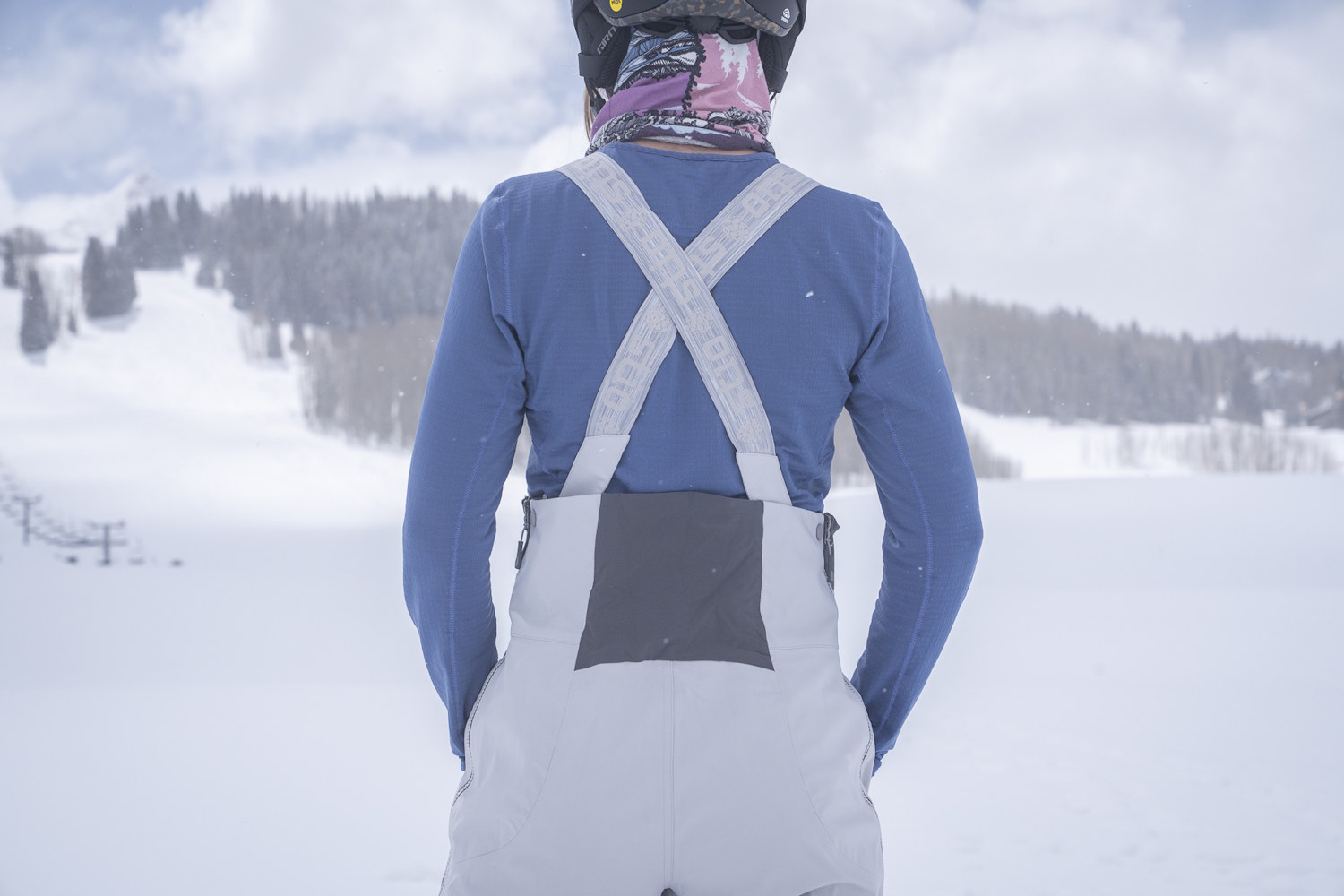
Ski Bibs for Women Comparison Chart
Scroll right to view all of the columns: Price, Sizes, Fabric, Insulation, Pockets, RECCO.
| Women’s Ski Bibs | Price | Sizes | Fabric | Insulation | Pockets | RECCO |
| Flylow Foxy Bib | $430 | XS-XL; short, regular, tall | 3-layer recycled Tactic stretch fabric | No | 5 | No |
| Salomon Women’s Absolute 3L Shell Pants | $380 | Standard sizes (S–L) | 100% recycled face and backer | No | 3 total – 2 zipped hand pockets (with one internal mesh drop pocket), 1 zip bib-front pocket | No |
| The North Face Women’s Freedom Bibs |
$220 | XS-3XL; short, regular, long | 2-layer DyVent waterproof membrane, 57% recycled nylon | No | 5 | No |
| Stio Women’s Figment Bib | $479 | XS-XL | Freeride (baggier) | No | 5 | No |
| TREW Chariot Bib Primo | $519 | XS-XXL; plus sizes 1X-4X; short, regular, tall | PNW-level 3L Primo Fabric woven with 100% recycled nylon | No | 5 | Yes |
| Patagonia Women’s SnowDrifter Bibs | $399 | XS-XXL | PFC-free 3-layer H2No 100% recycled polyester | No | 3 | Yes |
| Outdoor Research Women’s Carbide Bibs |
$329 | XS-4XL; short, regular, tall | 3-layer Pertex Shield with 40-denier face fabric | No | 3 | No |
| Airblaster Sassy Hot Bib | $320 | XS-XL | 2-layer Eco-Vortex stretch fabric | No | 5 | No |
| Jones Snowboards Women’s Shralpinist Stretch Recycled Bibs | $475 | XS-L | 100% recycled polyester 70-denier 4-way stretch face fabric | No | 5 | Yes |
| Mammut Women’s Haldigrat HS Bib Pants | $499 | 2-16 | 3-layer Mammut DRYExpedition membrane and 40-denier nylon face fabric | No | 2 | No |
| The North Face Summit Series Women’s Verbier GORE-TEX Bibs | $600 | XS-XXL | 75-denier X 40-denier 165 G/M² GORE-TEX 3L; 100% recycled polyester face, non-PFC DWR | No | 5 | No |
| Flylow Foxy Insulated Bib | $430 | XS-XL | Recycled 2-layer 100% polyester softshell, 100-denier | Yes | 5 | No |
| Halfdays Isabel Soft Shell Bib Pant | $355 | XS-2X; short, regular | 80% nylon, 20% spandex | Yes | 2 | No |
| Rab Khroma Kinetic Waterproof Bib |
$380 | XS-XL | 90% Polyamide, 10% Elastane, Polyurethane Membrane | No | 4 | No |
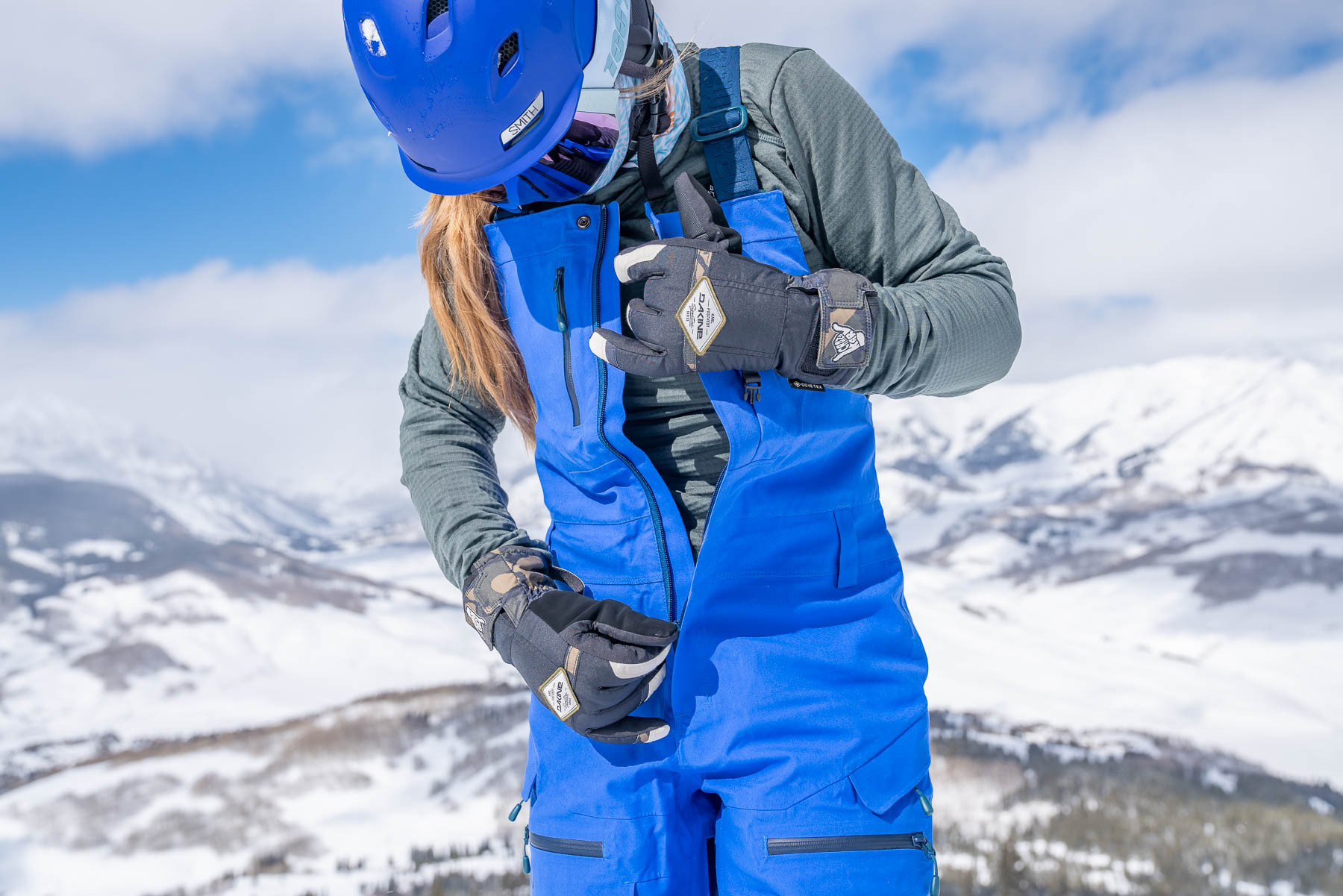

How We Tested Ski Bibs for Women
The GearJunkie team is made up of experienced and expert skiers and snowboarders that explore groomed terrain at ski areas as well as the backcountry byway of skis, splitboards, and snowmobiles. We explore runs in bounds and hut-to-hut all over North America, including bell-to-bell resort powder days, ski-to-surf trips such as on Vancouver Island, backcountry hut adventures, skimo races, and cross-country laps on the nordic trails.
Women’s ski bibs are essential for staying comfortable and dry while in motion, riding the lift, maintaining the rig, shoveling, or taking a snack break. Over the decades, we’ve used plenty of ski bibs and pants for our baseline. Since the inception of this guide in 2020, we have diligently field-tested dozens of ski and snowboard bibs for women. This is the list that comprises the best of the best.


Our Expert Testers
Senior Editor Morgan Tilton has been an outdoor industry journalist covering winter gear for more than a decade. That includes live reporting for the Snow Show Daily and serving as Snowboard Editor at Teton Gravity Research. She manages the majority of GearJunkie’s winter guides, including Ski Bibs for Women, which joined her desk in 2022. Tilton grew up in Colorado’s San Juan Mountains, where she learned to slide on snow at age 4, in her backyard: Telluride Ski Resort.
Contributing testers for this guide include journalists and skiers Mary Murphy and Kylie Mohr, as well as professional guide Kaylee Walden and athlete Sarah Stubbe.
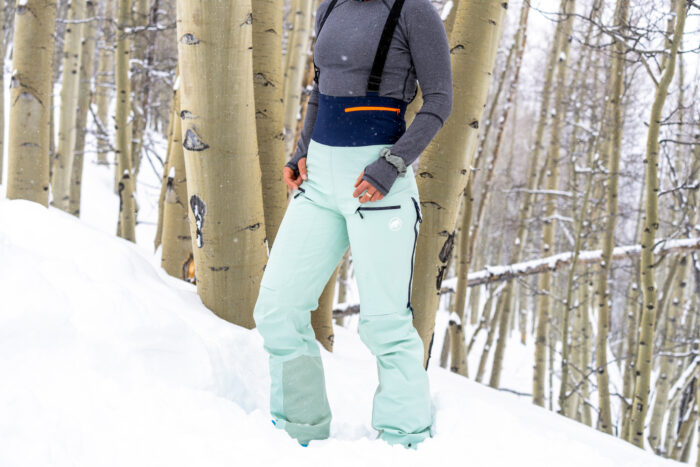

Our Testing Grounds
Today, GearJunkie Senior Editor Morgan Tilton lives in Crested Butte, Colo., with the Elk Mountains at her doorstep. She skis, snowboards, snowmobiles, and shovels unbelievable amounts of snow.
She’s also tested bibs on the blustery slopes of Eldora Mountain, foggy and icy days at Utah’s Snowbasin Resort, ample powder rounds at Telluride Ski Resort, adventures throughout the Tetons and British Columbia, and throughout the backcountry of the Elk and San Juan Mountains. The majority of her inbounds gear testing takes place at Crested Butte Mountain Resort, a few miles away from her shoveling habitat.


Our Testing Process
Our team field tests all of the women’s snow bibs in this guide.
To date in 2025, Tilton has tested women’s ski bibs for 39 days and 146 hours — including days skiing, snowboarding, touring, sledding, and cat skiing. Those days cumulated 164,000 vertical feet of ascent and 554 miles of snow travel.
In 2024, Tilton spent 54 days and 200 hours testing bibs. In 2023, she tested bibs across 35 days and 114 hours. Her outings included frontcountry and backcountry trips including snowmobile and trailer shenanigans. Days entailed blizzards, sub-zero temps, harsh wind, heavy and wet snow, plenty of perspiration, and sunshine. She also tests bibs while shoveling, but doesn’t track those hours.
While testing women’s ski bibs, we assess durability, overall fit, ease of movement, protection, fabric feel, breathability, ventilation, warmth, zipper quality, pocket placement and utility, drop seat integration, and functionality.
In addition to our experience, we consider the most innovative, novel, legacy, popular, and bestselling women’s ski bibs on the market.
These bibs represent a broad range of price points, designs, and applications for various preferences.


Buyer’s Guide: How to Choose the Best Ski Bibs for Women
Many ski bibs for women are suitable for a range of winter activities, from shoveling and snowshoeing to snowmobiling, winter hiking, skiing, and snowboarding.
Consider Activity & Usage
Generally, the pricier a ski bib is, the more protective it is against the elements. Most bibs last many seasons, so you’ll want to consider a few factors before investing.
Consider the average ambient temperature and weather conditions, as well as your body heat:
- Do the temperatures hover at 0 degrees or rise toward 30 degrees?
- Is there often wind chill?
- Do you expect dry or wet snow?
- Will you be consistently moving, or do you anticipate being sedentary, such as on the ski lift or while watching the kids play in the snow outside
- Do you generally tend to run hot or cold?
Depending on the activity and output, you’ll want either an insulated or uninsulated bib. If you’ll be active, you’ll need ventilation. If you expect precipitation, you’ll wish to moderate or high waterproofness (which varies bib to bib). Each of those factors influences the price tag.


Bibs for Skiing vs. Snowboarding
For skiers versus snowboarders — who use a slightly different range of motion on the mountain and use different boots — some bibs may work better than others.
One of the most significant factors is how the pant leg hem and gaiter fit. Some designs are streamlined and narrow to best fit over a ski boot neck. Other pant leg designs have a tad wider circumference. Others offer a zipper or snap closure that can widen the pant hem to slide it over the snowboard or splitboard boot. Not all gaiter designs work well with soft, traditional riding boots.
Snowboard-branded designs among our top picks include snowboard-branded designs, such as the Jones Snowboards Women’s Shralpinist Stretch Recycled Bibs and Airblaster Sassy Hot Bib. For snowboarders and splitboarders, we recommend considering our overall pick, the Flylow Foxy Bib, and our most durable pick, the Ortovox Women’s 3L Deep Shell Bib Pants, which offer generous pant legs to cover broader boot collars.
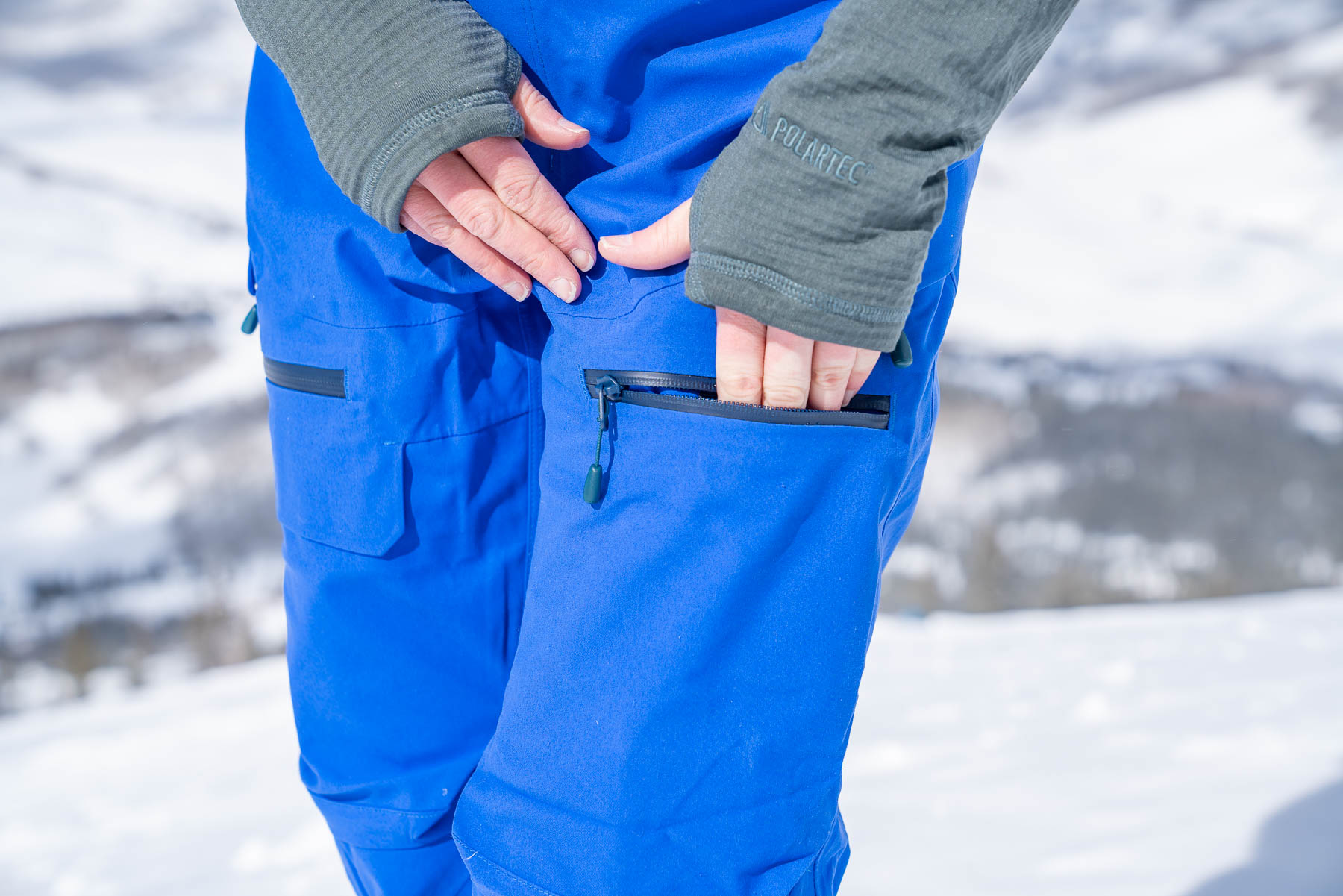

Drop Seat: Queen Detail of Ski Bibs
For the uninitiated, the drop seat is exactly what it sounds like: A trap door that opens on the backside of your snow pants, so you can easily do the deed.
While many ski bibs for women have a side zipper that allows the fabric to fold back, not all breadths are created equal. Generally, the baggier the fit and longer the zipper, the broader the swath that can swing away to give you space.


Also, not all ski bibs have drop seats. Some designs have a front zipper for entry, while others are low-cropped, so they’re easier to pull on without a lengthy side zipper.
Here are the zipper designs that can facilitate a drop seat:
- 300-degree zipper, hip-to-hip clamshell opening
- left side zipper
- right side zipper
- two side zippers — you choose as you go
Side zippers can double as the entry and exit for pulling on your bibs.
When to Use a Drop Seat
Drop seats are super convenient in the backcountry setting and at the resort.
You don’t need to take off your jacket in a stuffy stall to pull off your suspenders to relieve yourself. Instead, you snug your coat, pull the zipper around or down, and follow your routine.
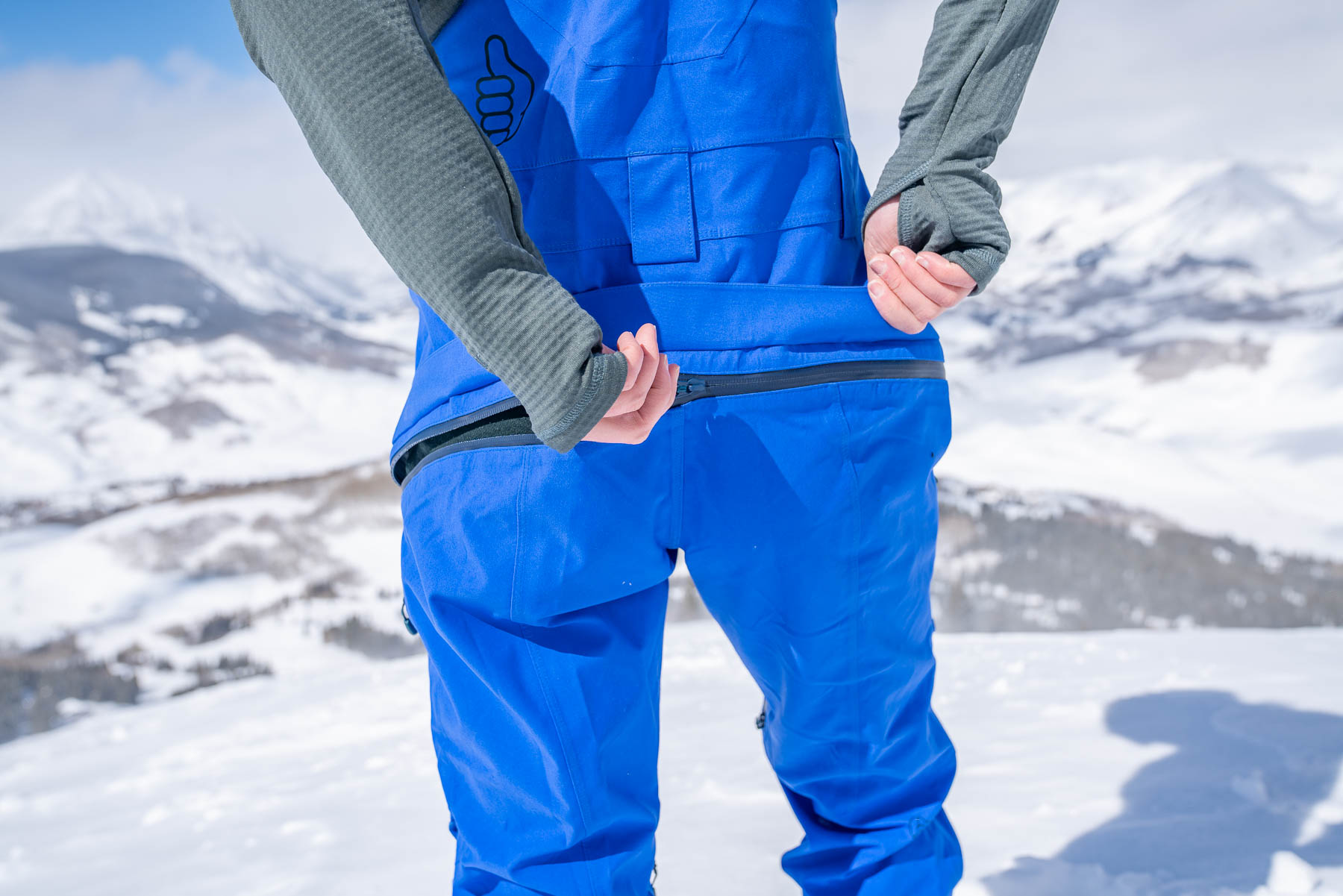

Types of Drop Seats
The drop seat on the Airblaster Sassy Hot Bib is unique in that it wraps nearly entirely around. The zipper goes 300 degrees — imagine a clamshell opening up. An exterior storm flap also covers the zipper, adding style points and protecting the teeth. The drop seat zipper of the TREW Chariot Bib Primo likewise wraps around your torso, parallel to the ground, with a smooth storm flap.
Other drop seats feature a lengthy side zipper that reaches down the leg for an even larger opening: The fabric then folds back and out of the way. This design can be convenient for managing variable conditions — like squatting over uneven or deep snow — in the backcountry, like the Ortovox Women’s 3L Deep Shell Bib Pants.
Some bibs only have the drop seat zipper on one side. Other styles offer zippers on both sides, which can be helpful if you’re managing a heavy pack or feel immobile on one side. Tight shoulders can make it hard to reach back or across to grab the top of a side zipper — unless the pull is large enough to grip and the zipper is positioned just right.
Ideally, each side zipper is topped off with two separate zipper pulls, so we can secure the zipper for the day with one pull at the top and use the other to activate a side vent when needed. The top of the zipper often has a secondary form of security, like a snap or garage for the pull. If it doesn’t, that’s a red flag because long side zippers tend to wiggle their way open without a lock.
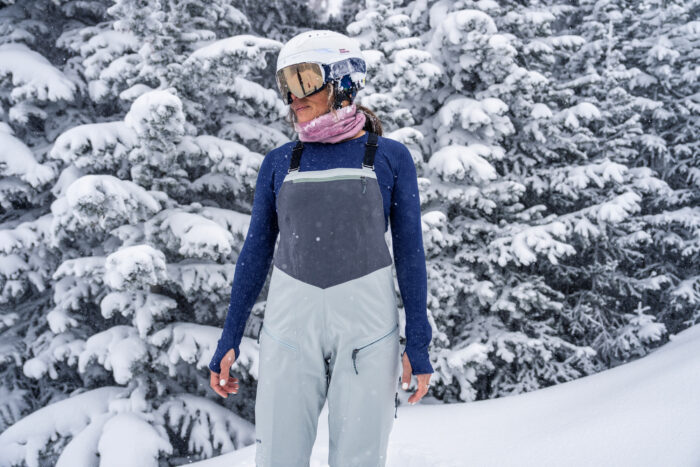

Type of Fit
In addition to checking the specific size of a bib, silhouettes come in a variety of fits, which can be functional or reflect a certain aesthetic.
That includes regular — not too baggy or too tight — as well as a roomier and relaxed fit. On the alternative side, you’ll find a more athletic, slim, and fitted design.
Athletic Fit
These are the leanest bib silhouettes, which can feel good if you don’t like extra material and prefer a slim-fitting pant.
Fitted/Athletic Fit
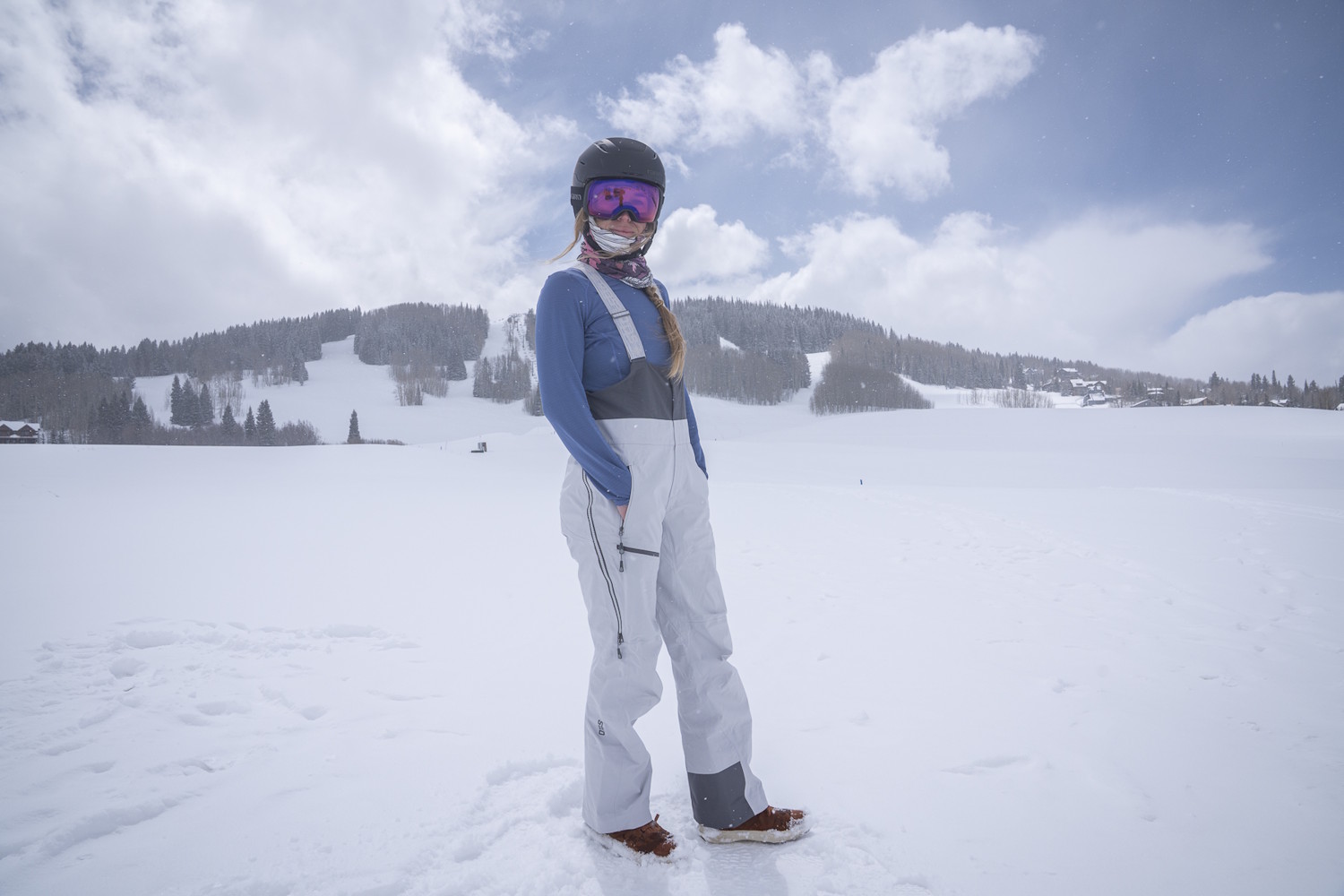

Regular Fit
Regular fits can also be tailored, meaning there is articulation to the design that offers a flattering feminine shape without making the style straight and boxy. A tailored design is also functional, because it can remove extra fabric that can otherwise get caught, fold, and be uncomfortable, like articulated knees. The tailoring of the bib, especially around the chest, and the suspender strap placement can also play a role in how restrictive or flexible the upper part of the bib feels.
If a bib is well-fitted, that doesn’t necessarily mean it’s uncomfortable, because our top bibs here are all constructed with stretchy material. Though, the flex of fabrics varies. And styles differ with how much length and width are offered in the torso area and where that fabric is located. Seams can be less forgiving from one design to the next.
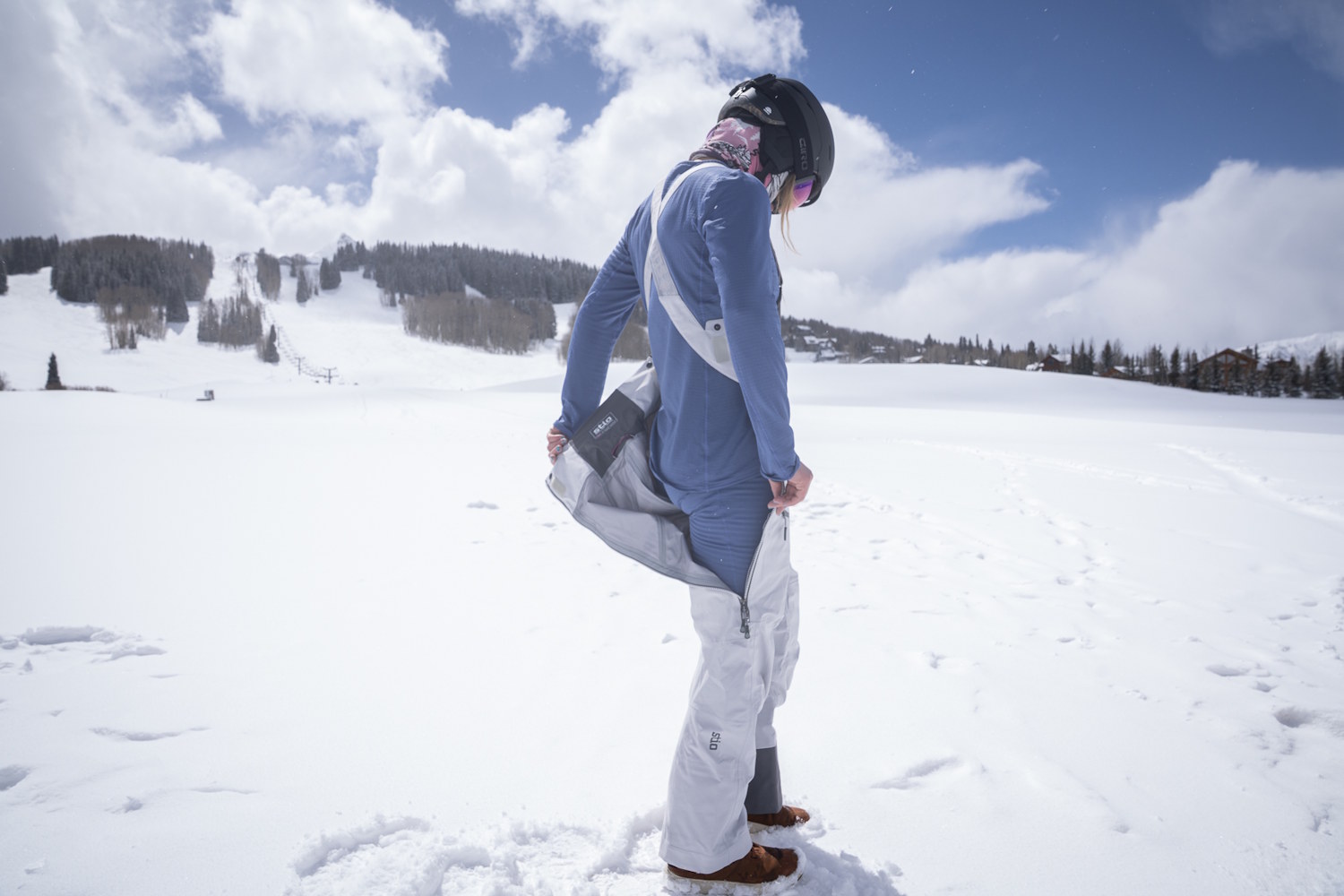

Regular Fit: Women’s Ski Bibs
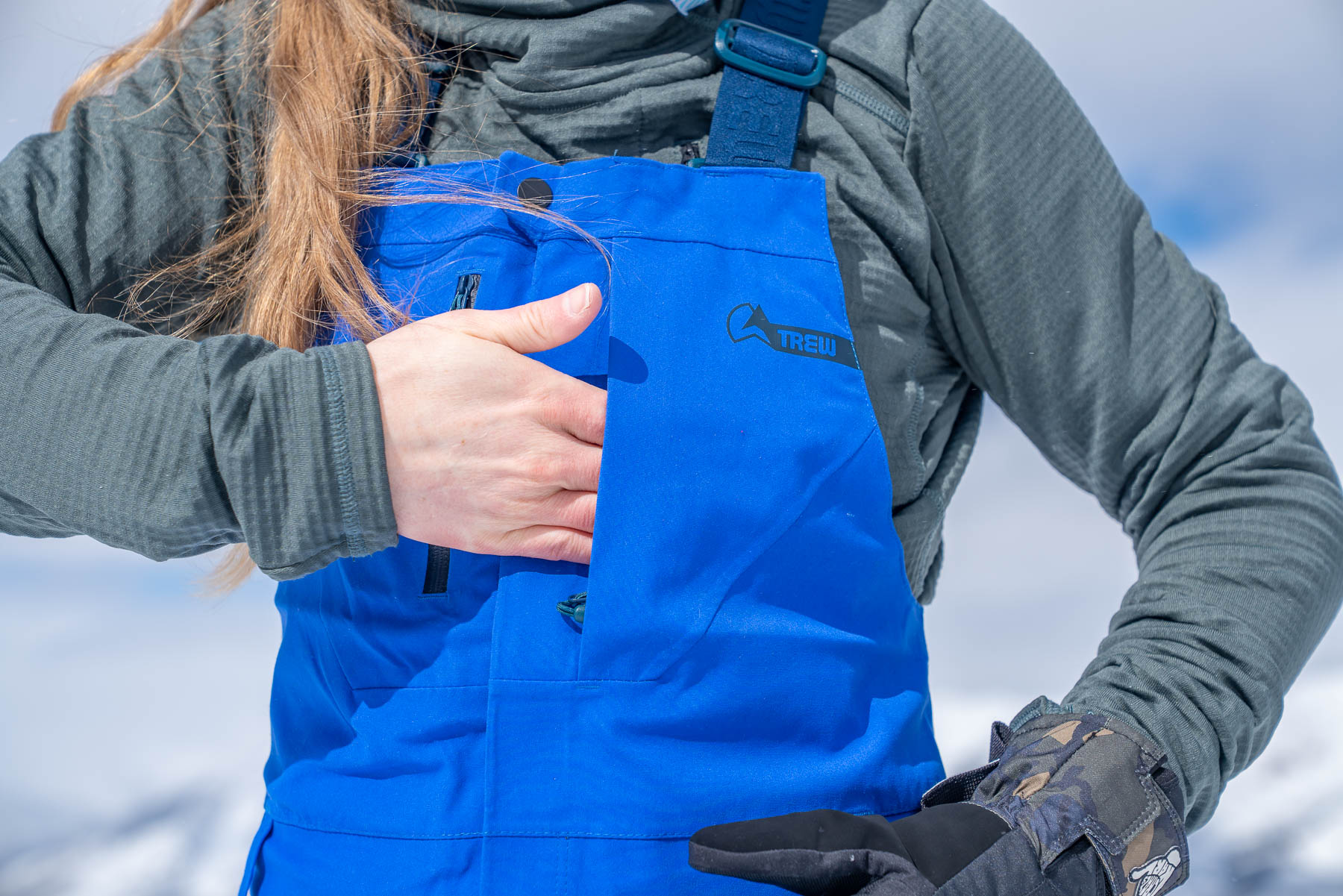

Roomier Fit
If you want an unencumbered range of motion, go with a more relaxed fit that’s roomier or freeride style. Extra space can be comfortable for adding layers beneath or big moves on backcountry days, slopestyle, jumping off cliffs, and freeriding across conditions. If you want the option to pull on thicker layers beneath and don’t mind extra fabric, consider sizing up.
The majority of our choice bibs have a regular fit, while a few are roomier or fitted.
Roomier/Freeride Fit


Weather Resistance: Chemical-Free Treatments
An acronym that you now see everywhere is PFCs (perfluorinated chemicals). They’ve been used for decades in the outdoor industry to impart Durable Water Repellent (DWR) properties onto technical fabrics by coating the exterior surface. PFCs also exist in other steps in the manufacturing of textiles.
These components can generate health problems for humans and animals, and they’re extremely toxic and persistent. Most brands have switched to PFC-free water repellents that function as well as their chemical counterparts.
If you’re looking for a toxic-free textile, most brands have transitioned to PFC treatments as of 2025. Recently, Patagonia set an industry benchmark in the 2023-2024 season with a collection of high-end 3-layer snow apparel that’s utterly free of PFC chemicals, including the manufacturing process of the textile, the fabric, and the applied waterproof barrier on the surface. That capsule includes the Patagonia Women’s SnowDrifter Bibs.
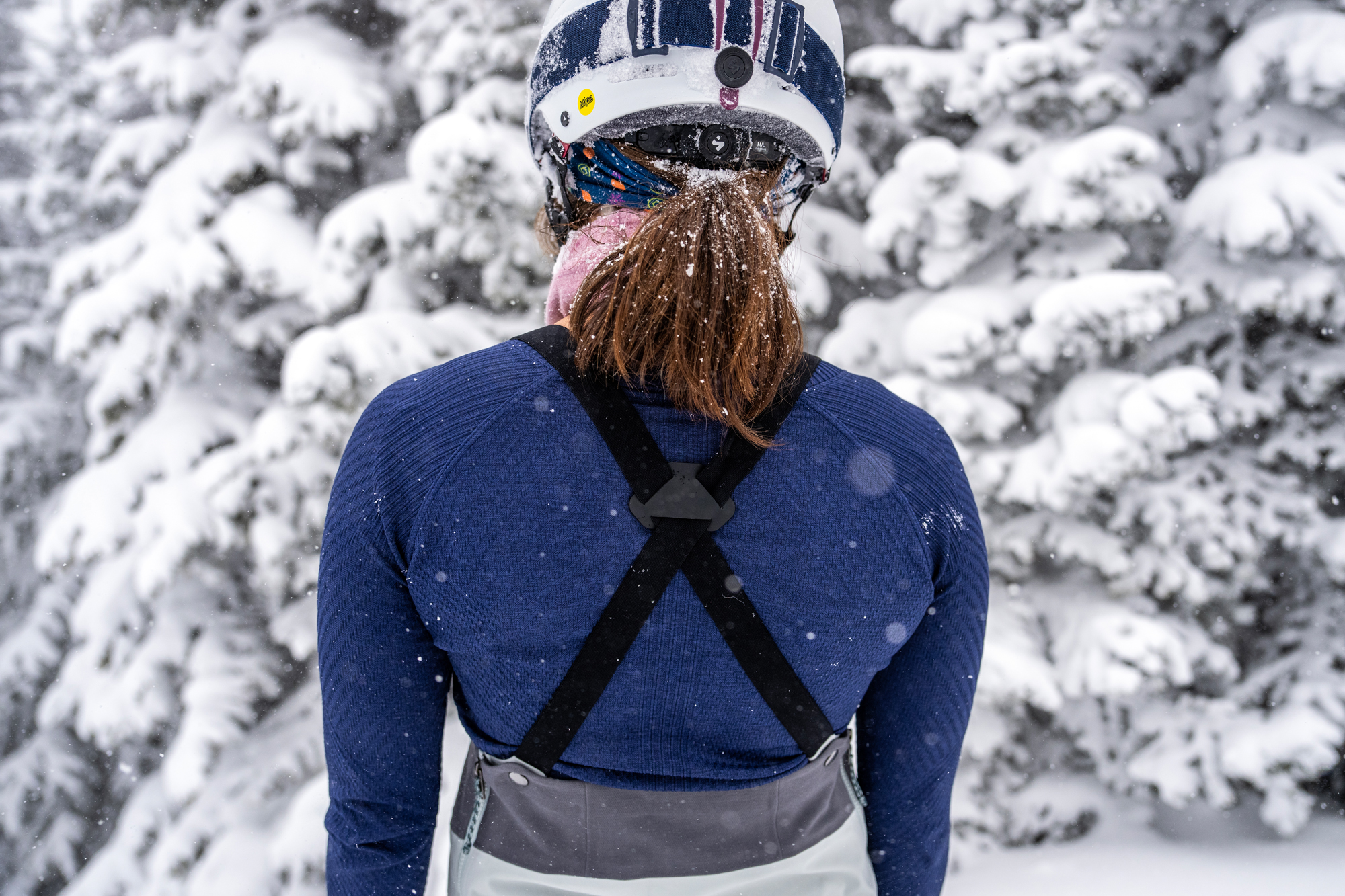

Waterproofness
A waterproof bib is ideal for outside use in wet snow, rain, or drizzly weather. The top-tier standard for waterproofness is GORE-TEX, a membrane integrated into various textile designs. The material is waterproof, windproof, and breathable. Many brands likewise have a proprietary version of waterproof-breathable fabrics.
Waterproofness measures how much water a fabric can withstand before it leaks. The rate of waterproof fabric varies from 5,000 to 20,000mm or greater. The latter end of the spectrum leads to a less breathable fabric.
- 0-5,000 mm: Resistant to light rain, dry snow
- 6,000-10,000 mm: Waterproof for light rain and dry, non-heavy snow
- 11,000-15,000 mm: Waterproof for moderate rain and dry, non-heavy snow
- 16,000-20,000 mm: Waterproof for heavy rain and wet snow
- 20,000 mm and greater: Waterproof for heavy rain and dense, heavy snow


Many bibs are waterproof or offer a degree of water resistance, which works fine in drier winter climates and where the snow water equivalent (the amount of liquid water in the snow) is lower.
There are four general snow climates: coastal, transitional, intermountain, and continental.
- Coastal: Generally, the closer you are to the coast, the more precipitation you’ll experience and the water content will be higher in the snow: It’ll be wetter and heavier.
- Continental: In contrast, the snow in continental climates is dryer, lighter, and accumulates less compared to the coast. That includes most of the Rocky Mountains, such as in Colorado.
- Intermountain: Intermountain regions and ranges show characteristics of both coastal and continental.
- Transitional: These areas are similar to the coast but with less rain and snow.
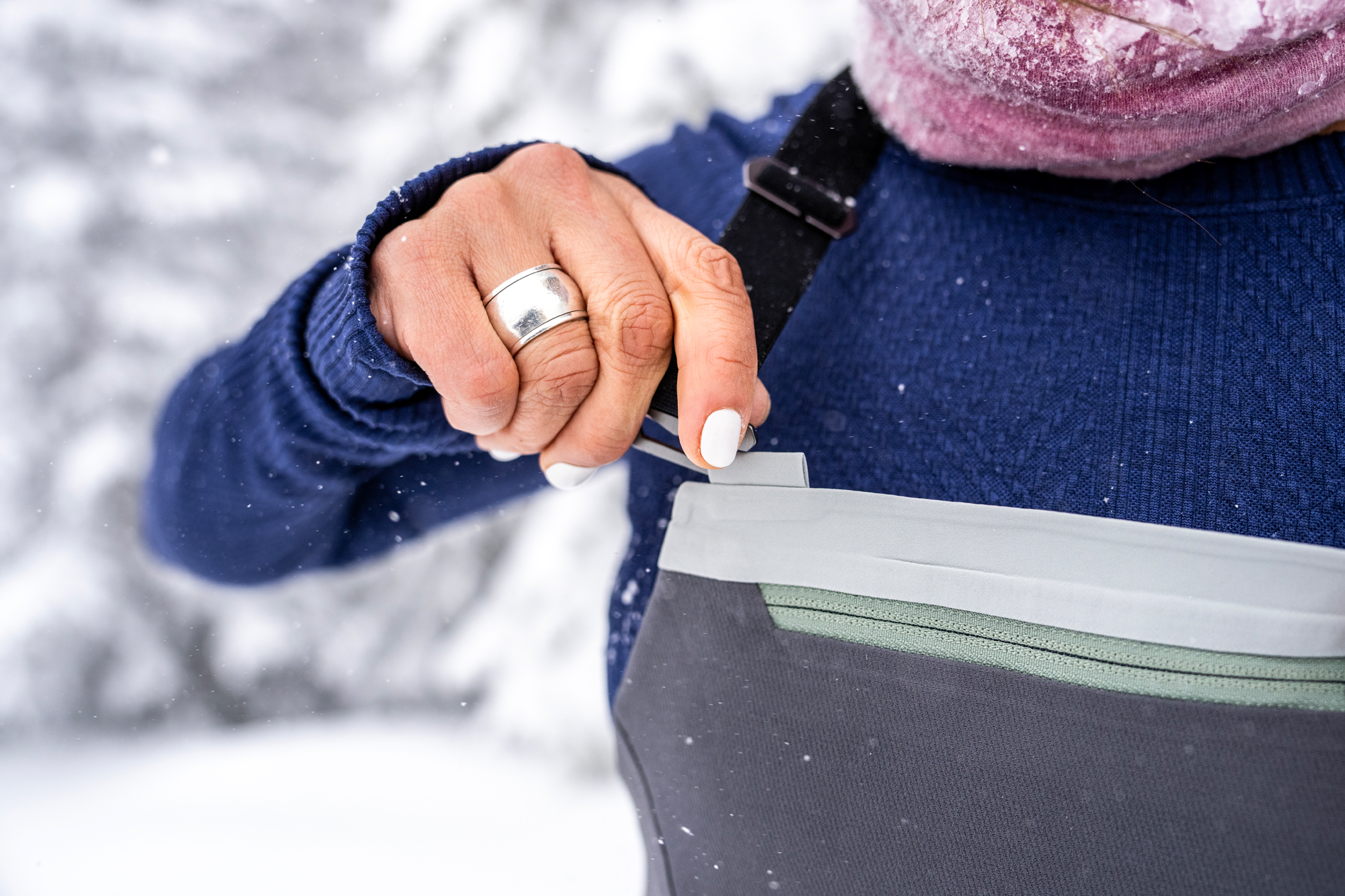

Examples, according to the Utah Avalanche Center:
- Coastal (wettest): California, Washington, Oregon, coastal Alaska, coastal British Columbia
- Transitional (moderately wet): Areas and targeted locations in Montana, northern Idaho, and Oregon
- Intermountain (mildly wet): Utah’s Wasatch Range, most of Idaho, Montana, portions of Northeast Oregon, and Southwest Colorado
- Continental (mostly dry): Colorado, Wyoming, New Mexico, interior Alaska, interior British Columbia
Factors that change the waterproofness or water resistance of a ski bib include the face fabric treatment, which can be eco-friendly formulas or toxic chemicals. Bibs can also have sealed seams to block moisture or waterproof zippers. Generally, the more water-resistant or waterproof a product is, the pricier it will be.
Many ski bibs can work fine across various conditions. However, if you are mainly snowboarding and skiing in a wet climate or the snow is heavy with water, you’ll want to invest in a hardier material to stay dry. If you mainly venture into the backcountry, it’s also not a bad idea to invest in apparel that can withstand those stormy conditions when you’re far out from the trailhead, even if the snow is drier.
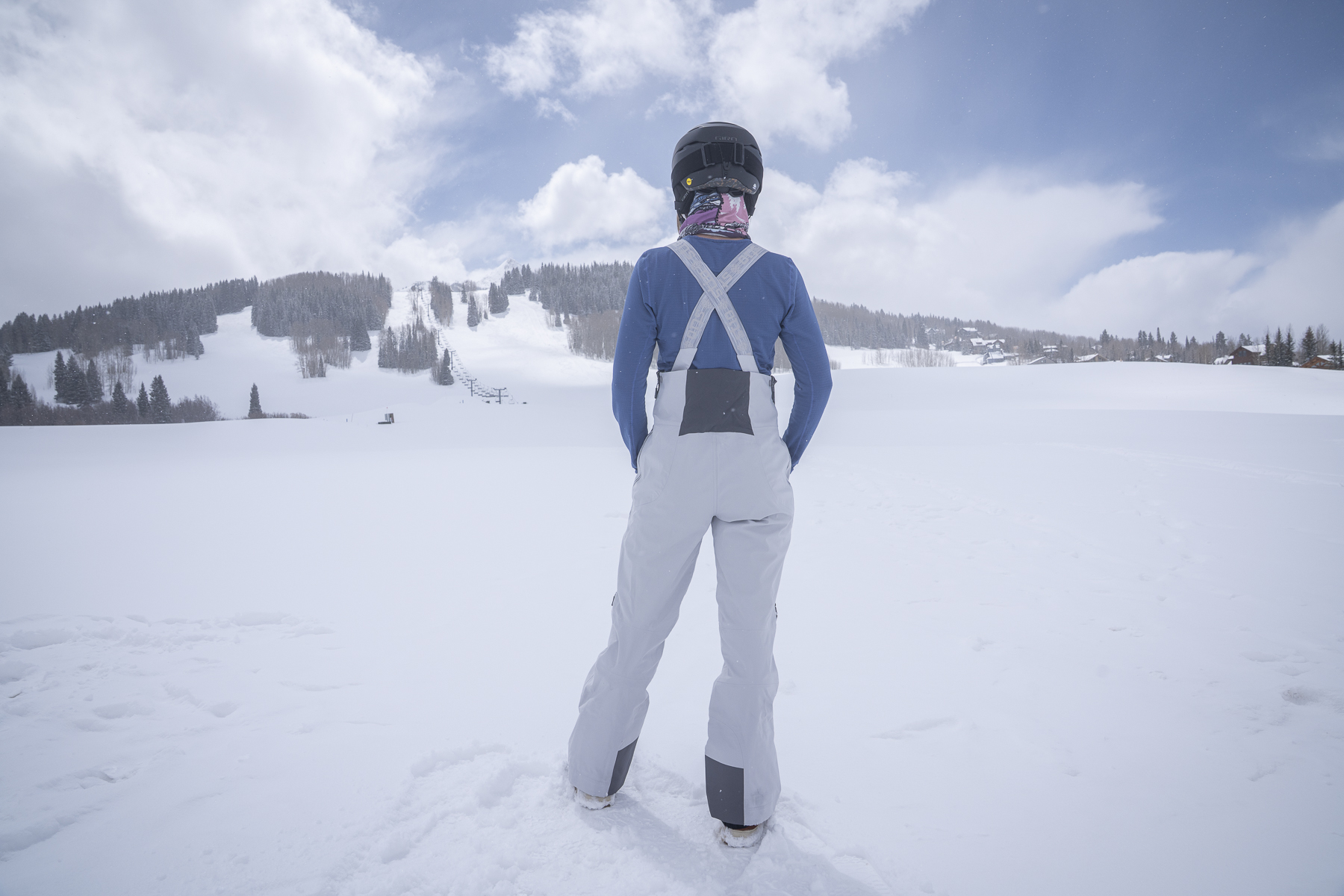

Alternatively, if you primarily or solely carve inbounds and adventure in a region with moderate or mild precipitation, consider reaching for a more economical bib, which will likely be lower on the waterproof totem pole.
We aim to break down each woman’s ski bib review with the waterproofness capacity, so that you know which options would work best for your go-to zone:
We have not received confirmation from Patagonia regarding the waterproof rating of the Patagonia Women’s SnowDrifter Bibs.
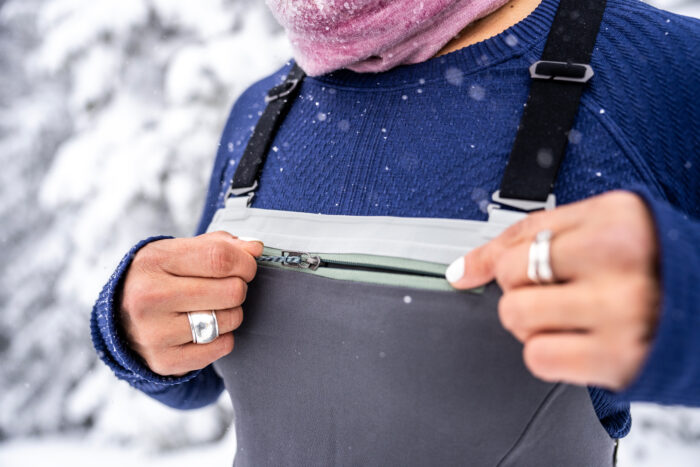

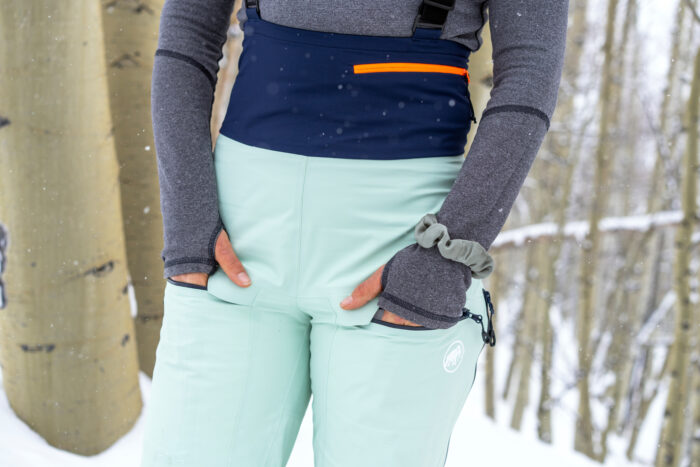

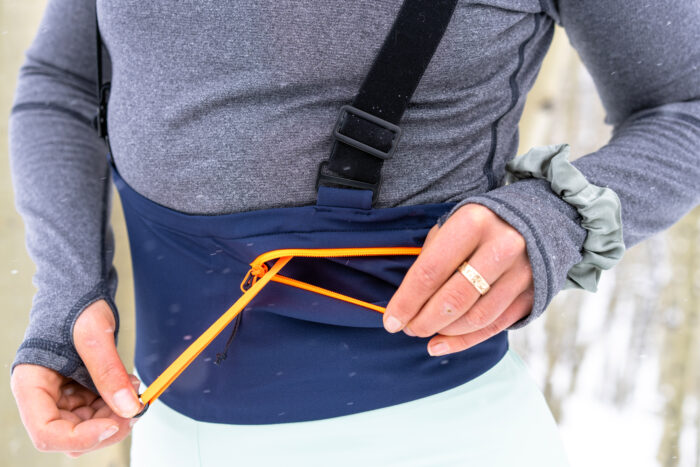

Pockets: Key Garnish of Ski Bibs
Functional pockets are a queen detail of ski bibs for women.
Thigh & Hand Pockets
Deep, wide thigh pockets are especially great to prevent your phone from bunching up near your hips. Some bibs, like the Stio Women’s Figment Bib, have traditional hand pockets, too. We love the combo of pockets on the Figment.
We test our thigh pockets with a large phone to make sure we can’t feel discomfort while sitting on the chair lift, bending over to adjust our bindings, or while deeply lunging up the skintrack.
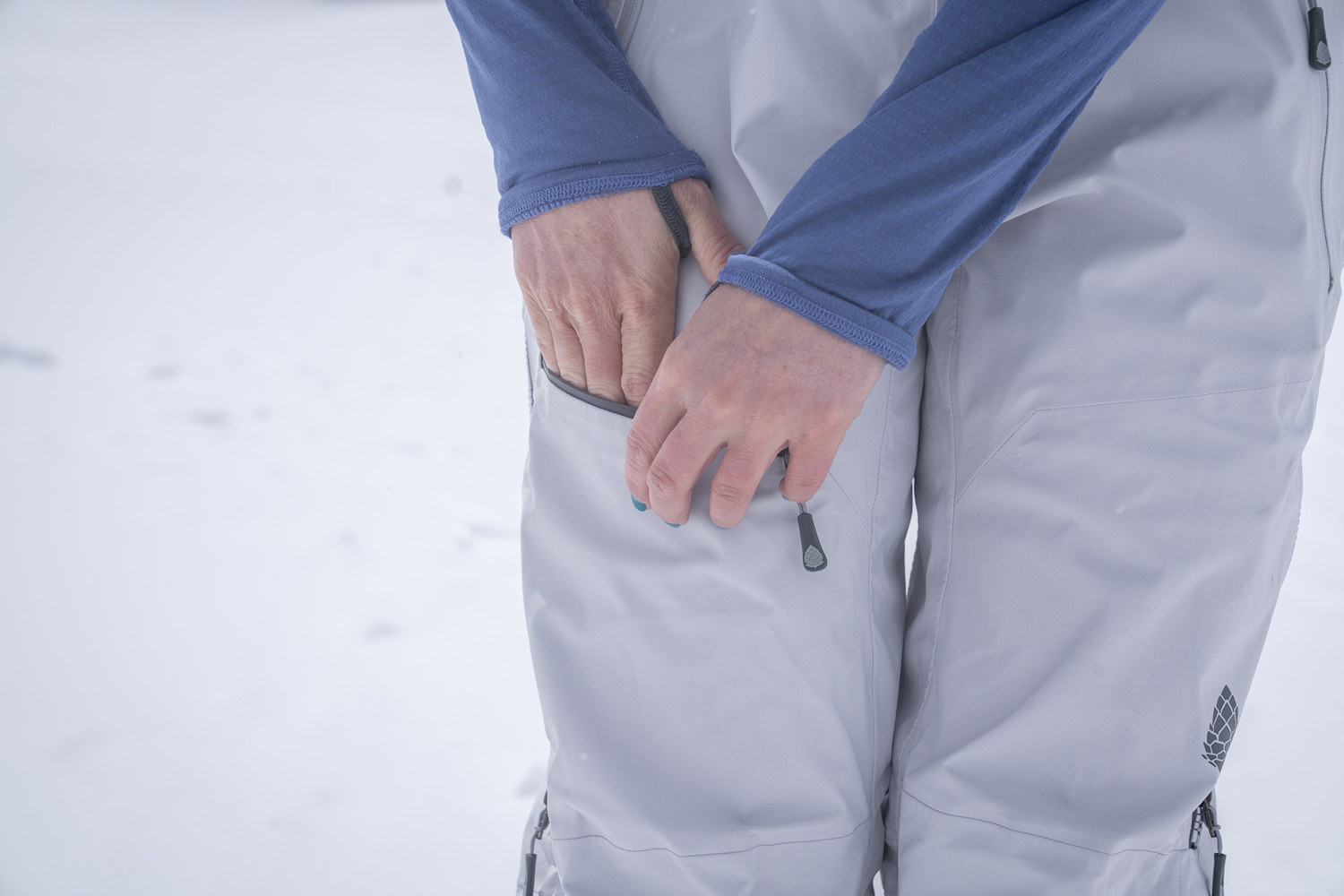

Chest Pockets
The bib’s torso has pockets of various sizes. There are top-entry zippers or side-entry pockets. The latter, known as a Napoleon pocket, has zippers that can face outward or inward, requiring the opposite hand to reach in.
The chest pocket arrangement on the Jones Snowboards Women’s Shralpinist Stretch Recycled Bibs maximizes space and is a clever, unique design. The Ortovox Women’s 3L Deep Shell Bib Pants thigh and chest pockets offer optimal roominess and efficiency.
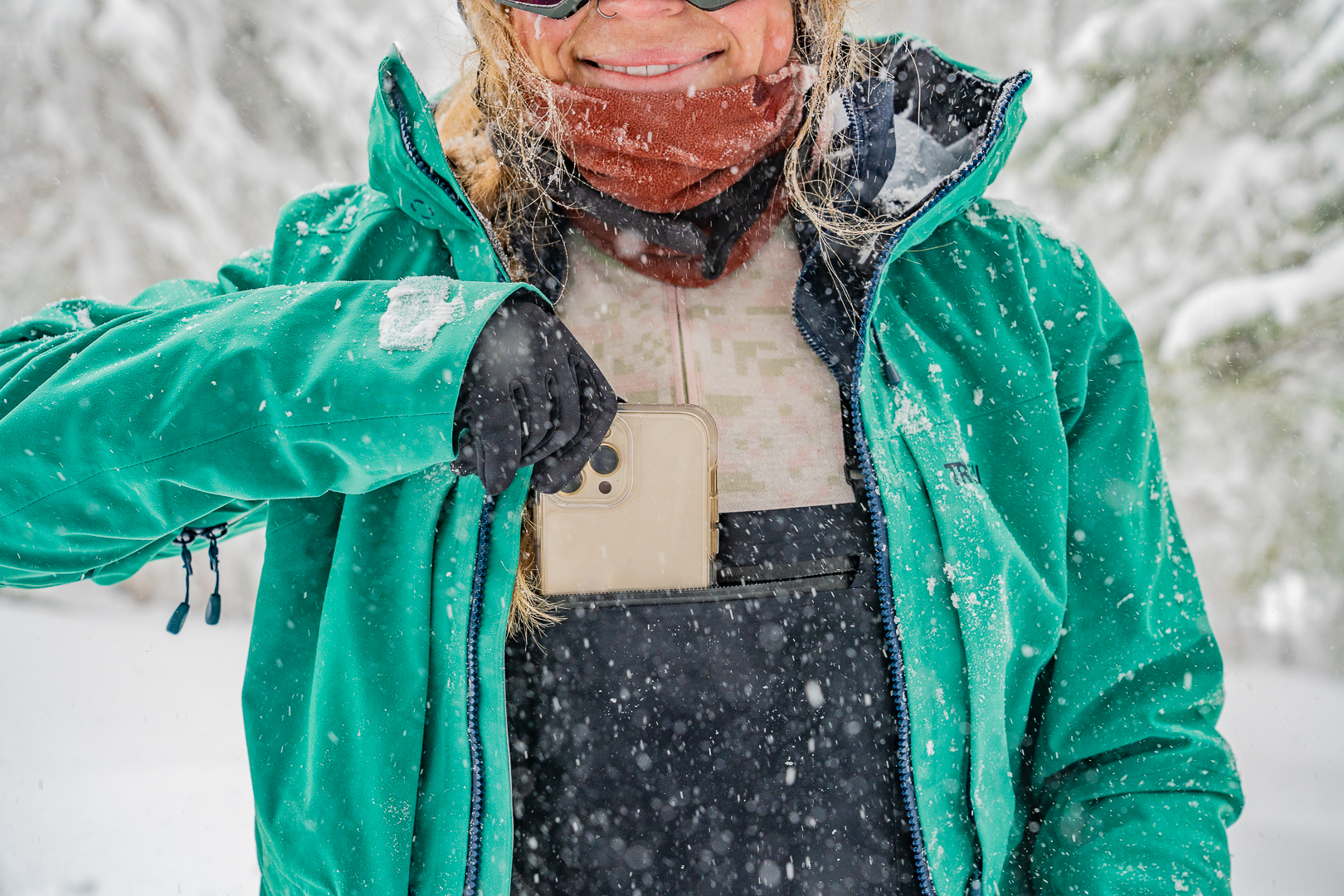

Mesh Stash Pockets
Inside exterior pockets, there is a trend of adding an interior mesh pocket that holds a phone or other small items like a key fob. We typically carry a large device, so these mesh hammocks can be too restrictive and not easy to use while wearing gloves, in our experience. They can even cause hangups when we’re trying to quickly slide our phone into our pocket, which is a pitfall.
Backside Pockets
Some designs have one or two pockets on the backside. We’re not the biggest fans of pockets on the buns, because we often need to sit when wearing our apparel.


Pockets: A Safe Place for Your Avalanche Beacon?
Beacon manufacturers universally recommend wearing the transceiver with the supplied chest harness. For women, you’d layer your sports bra, base layer top, then chest harness. You’d ideally place your bibs over the chest harness and beacon, as long as you can slide your gloved hands inside with your outer layers zipped down.
Apparel designers often add large, zippered pockets on ski bibs on the thigh, chest, or midsection to fit large electronic devices. For some skiers, bib pockets feel more comfortable and easier to use for beacons than harnesses. Certain beacons are compact enough to fit in an internal pocket or an integrated mesh stash pocket that’s inside. Some internal bib pockets have integrated lanyards or tethers.


AvalancheSafety Gear: How to Wear Your Beacon
A harness is usually included with a beacon purchase. The harness keeps the beacon on the body and close to the airway. The system is designed to protect the display, prevent accidental mode switching, and release the system while keeping the beacon attached to the person.
If you’re going into the backcountry, ensure your avalanche transceiver is quickly accessible and far away from your other electronics, such as a phone and radio. According to the Utah Avalanche Center, you want your beacon 20 cm (8 inches) away from other electronics while transmitting and 50 cm (20 inches) away from electronics when it’s in search mode.


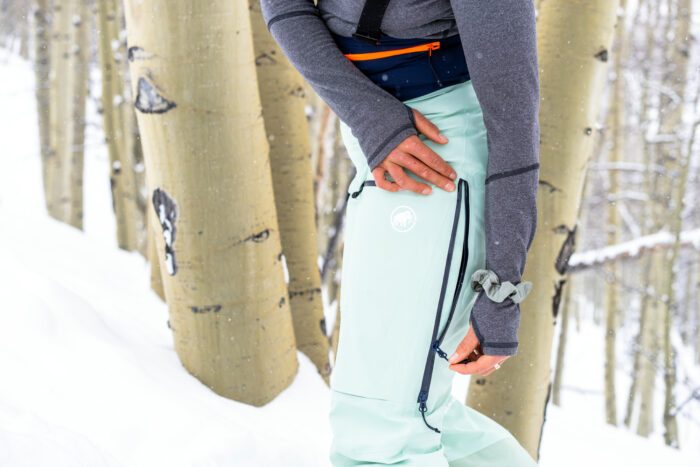

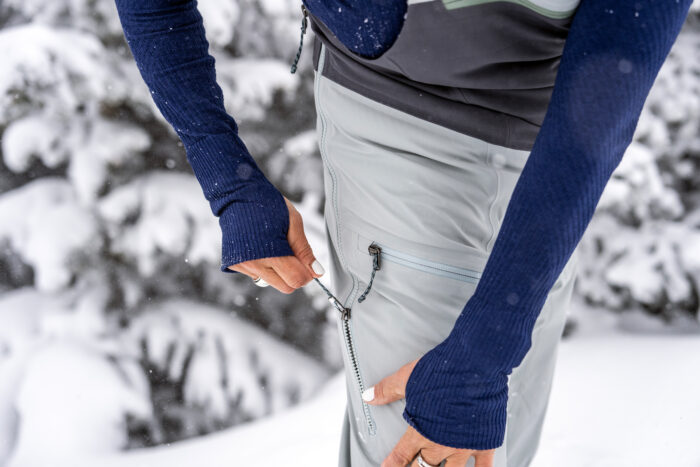

Ventilation
We highly recommend picking out ski and snowboard bibs with ventilation. Designers place vents alongside each leg on the exterior or interior. The zippers will be one-way or two-way. Few zippers are fully waterproof, but some brands invest in that upgrade.
Certain bib designs have a side zipper with two zip pulls. When the zipper is closed, you can utilize the portal as a vent with the second pulley throughout the day.
Inside the zipper, you sometimes have a mesh liner for protection against sun or snow flurries, while other brands opt for no mesh. Overall, the length of a zipper for leg ventilation will vary.
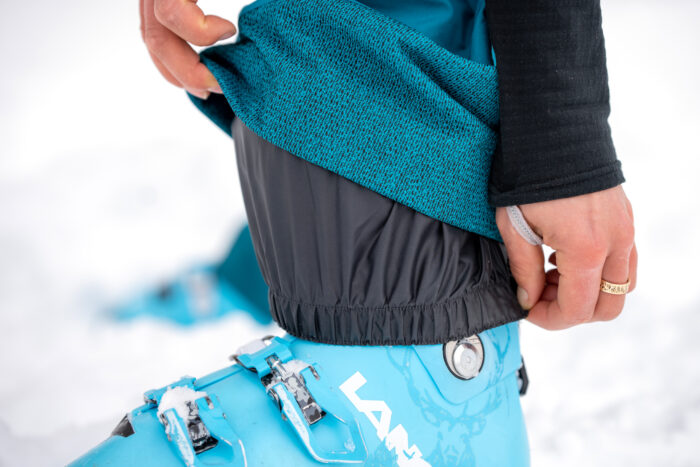

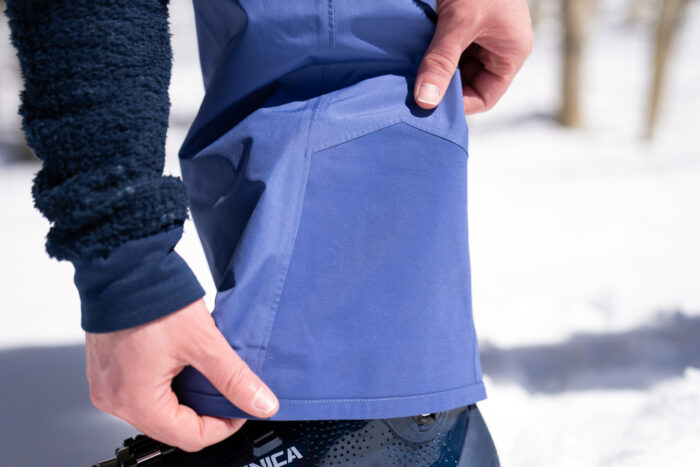

Cuffs & Gaiters
We also recommend that the ski or snowboard bibs you choose have internal gaiters that secure well over boots (gaiters with boot adjustment access can be a plus for some).
Some cuffs are narrower than others and fit better over ski boots than snowboard boots’ wider throat. Some cuffs offer better customization with side zippers or snaps, letting you widen the circumference to pull the pant leg over your boots. We especially like this detail for snowboard and splitboard boots, particularly when a BOA system is involved.
Manufacturers often reinforce exterior cuffs with tough materials like Kevlar, SuperFabric, Dyneema, Cordura, Vectran, or hybrid textiles for extra durability. For backcountry riders, that added reinforcement helps prevent shredding and protects the fabric from ski edges or crampons during ascents.
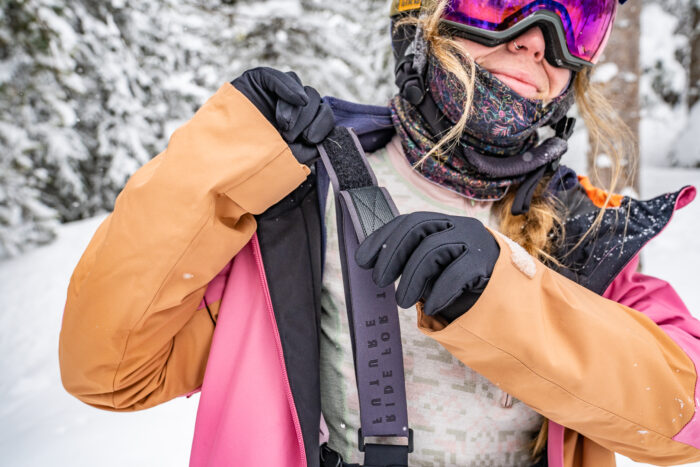

Suspenders
The two straps that hold up your bibs are surprisingly complex and can make or break a bib. Suspenders are typically made of an elastic material, which varies in width, stretchiness, and rebound across designs.
Underneath some suspenders, you’ll find a grippy material that helps the strap stay in place throughout the day.
Suspenders can cross the upper back and shoulder blades or go straight over your shoulders. One of our biggest gripes is when we pull on bib straps that cross in the back but are not easily adjustable while being worn, or they tend to get caught and uneven, which is annoying.
Bib straps can be fixed or detachable. The attachment point can be a slide-in hook that is releasable in the front, allowing you to undo the strap while pulling on or off your bibs. Straps can also be secured via Velcro.
Most bib straps are adjustable in length via a plastic slider.
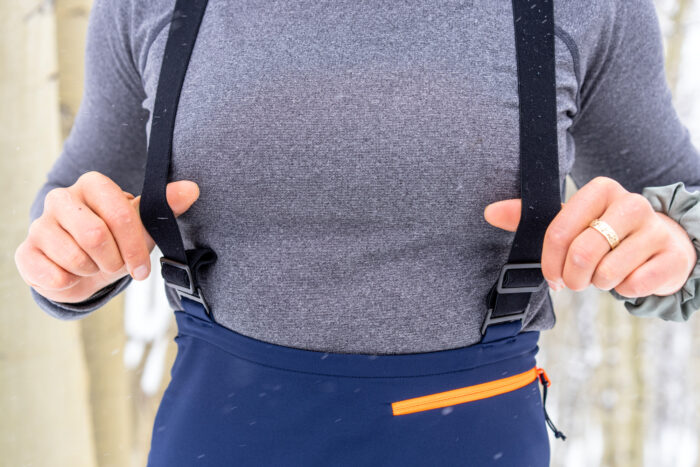

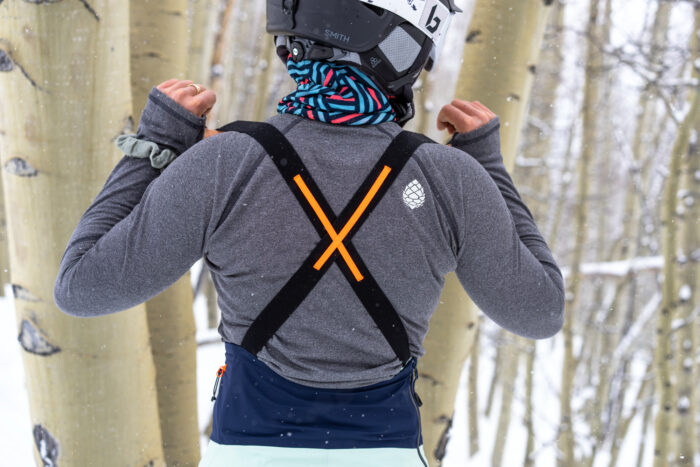

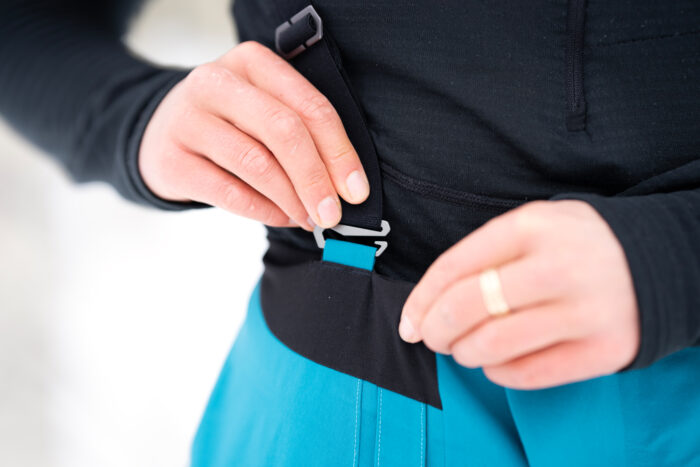

RECCO
RECCO is a safety system used by ski teams and rescue professionals to help find misplaced people, whether lost in the woods, held up due to injury or a health ailment, broken gear, or potentially trapped under snow due to an avalanche. It’s a great safety addition to have during an emergency.
The first part of the system is a reflector embedded into outerwear and gear to help locate the wearer. A RECCO reflector doesn’t transmit any signals or need batteries. The other side of the equation is the RECCO detector, which transmits an active signal with a range of up to 120m through the air and 10 to 20m through the snow.
Note that a RECCO reflector does not replace an avalanche transceiver, also known as an avalanche beacon. If you plan to go into the sidecountry, such as out of the boundary gate at your local ski area, or into the backcountry, be sure to wear and know how to use your avalanche transceiver. Likewise, ensure your ski partners wear and learn how to use avalanche transceivers.
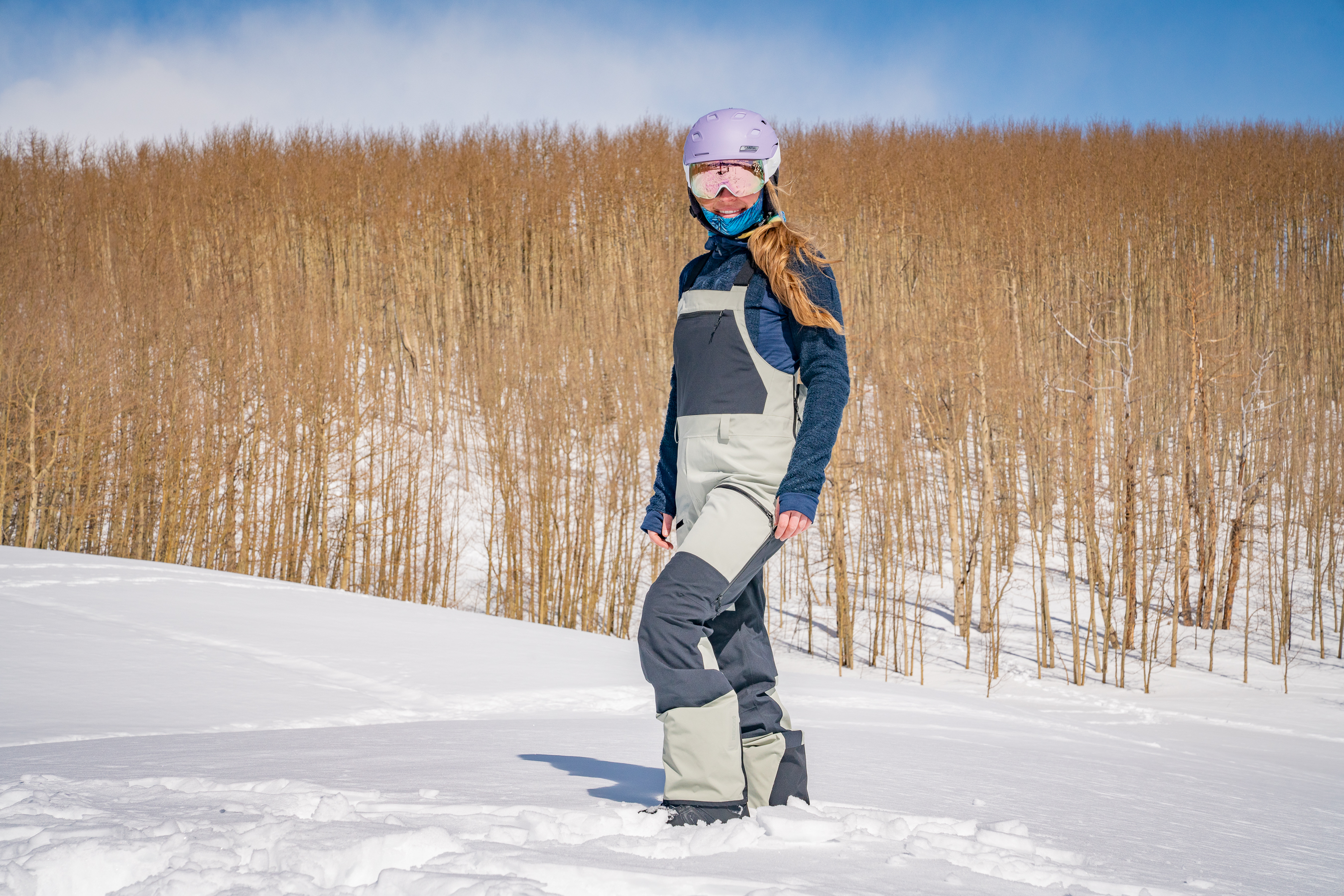

How To Wash & Dry Your Ski Bibs
Many ski bibs now incorporate GORE-TEX ePE fabric, which is PFAS-free. Here’s the good and the bad:
Washing PFAS-free fabric reactivates the DWR and removes the oil and grime that barricades the waterproofness and breathability.
However, these fabrics are more susceptible to oil-based stains, whether olive oil from your breakfast burrito or a drippy chairlift.
Detergent & Rinsing
“PFAS-free DWR coatings require more frequent wash and care to maintain water repellency on face fabric,” explained GORE-TEX expert Marshall Balick at an outdoor industry presentation Senior Editor Morgan Tilton attended in Nelson, British Columbia.
According to Balick’s presentation, technical wash detergent is ideal because it does not contain additives. If one isn’t available, choose a conventional product that is scent-free and does not contain fabric softener, like Seventh Generation. If you only have a detergent with a scent and fabric softener, such as Tide, it’s still better to wash your garment than not. But be sure to double-rinse. Later, it’s best to wash your garment with a technical detergent, which will remove the additives from the fabric.
Frequency & Machine Drying
How frequently do you need to wash your ski bibs? It’s time to clean when your garment wets out and water no longer beads on the surface.
You’ll hang the outer layer to dry. Then, you must put it in the dryer for 20 minutes on medium heat to fully reactivate the DWR.
Aftermarket Waterproofing
If that process hits a roadblock and no longer rejuvenates the face fabric (to enable droplets to bead), you must reapply an aftermarket product like Nikwax.


Price & Value
Depending on how often you hit the slopes, price is a factor. If you’re starting in a snow sport or only make it to the mountain several times a year, consider a more budget-friendly women’s ski bib.
As you gain experience, you can always invest in a higher-quality bib that will ultimately perform better and last longer on the mountain season after season.
Budget: Women’s Ski Bibs for Weekend Resort Trips
The vast majority of our top picks hang on the $300 rung: Airblaster Sassy Hot Bib ($320), Outdoor Research Women’s Carbide Bibs ($329), Halfdays Isabel Soft Shell Bib Pant ($355), Rab Khroma Kinetic Waterproof Bib($380), and Patagonia Women’s SnowDrifter Bibs ($399). You’ll find excellent applications for specific uses with each of these designs, so you’ll also be giving up a few design details.
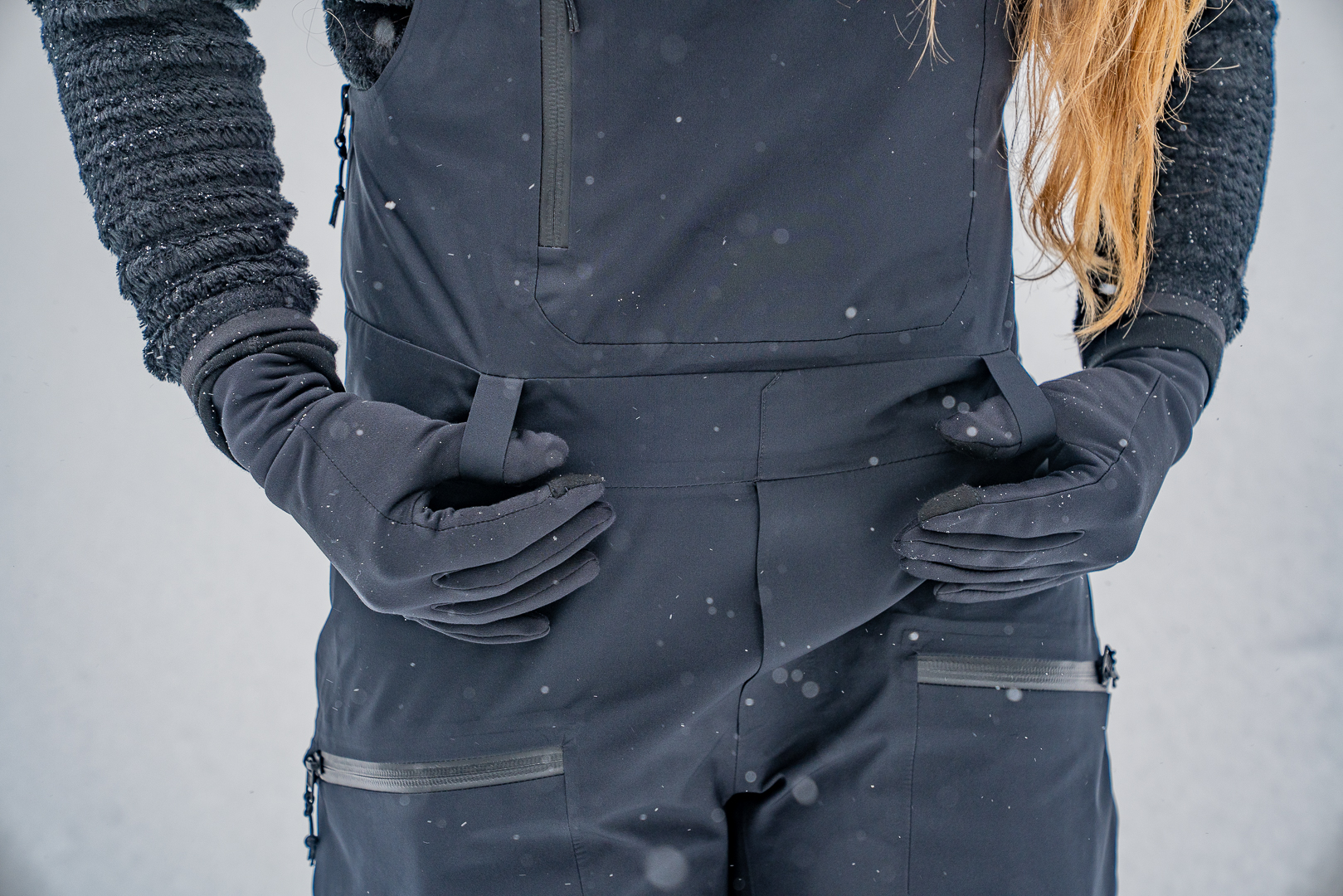

For instance, the Sassy Hot Bib fit and fabric are not the best for backcountry riding and touring. The Outdoor Research Women’s Carbide Bibs pants slide well over ski boots, not snowboard boots. The Halfdays Isabel Soft Shell Bib Pant is insulated and not functional for uphill pursuits or high-moisture climates. If you do homework on these designs to find the best one for your needs, you’ll be happy with any of these picks.
One queen budget pick is The North Face Women’s Freedom Bibs ($220), which doesn’t shine above any of our other favorite choices from a technical standpoint. It’s a 2-layer bib that serves weekend warriors.
Mid-Tier: Detailed, Long-Lasting Women’s Ski Bibs
In the next zone, you’ll find options like the Flylow Foxy Bib ($430), Stio Women’s Environ Bib ($459), and TREW Chariot Bib Primo ($519). Other options in this price tier include the Jones Snowboards Women’s Shralpinist Stretch Recycled Bibs ($475).
These women’s ski bibs are an investment in smart pockets, a stylish and comfortable fit, and excellent fabrics. Each has a drawback or two, but they still have near-premium details.
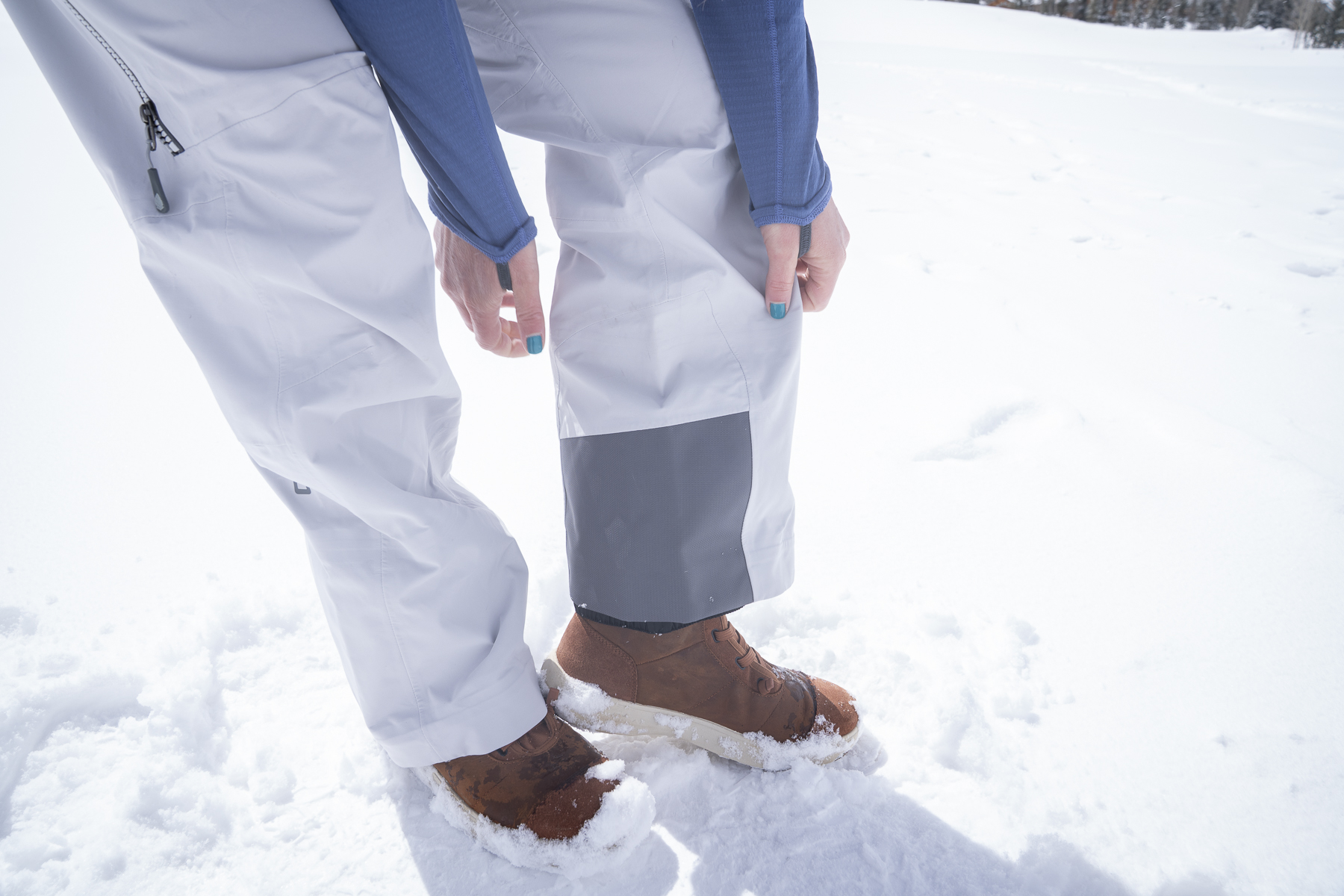

Premium: Top-Tier Durable Women’s Ski Bibs
If you mostly backcountry ski or splitboard, your bibs will likely experience more abrasion due to wearing a loaded pack with a hip belt, transitioning with the equipment, being exposed to the elements without shelter, or operating a snowmobile (and trailer) for access. If you snowmobile, it’s easy to beat up your apparel while maneuvering and riding the machine.
In that case, we recommend investing in a bib that is a more durable, premium option like the Ortovox Women’s 3L Deep Shell Bib Pants ($650), which will help protect you and keep you comfortable in the backcountry.
Generally, top-priced apparel also boasts the highest level of waterproofness, breathability, durability, sustainable manufacturing, ease of use, and an enjoyable, softer, quieter textile.
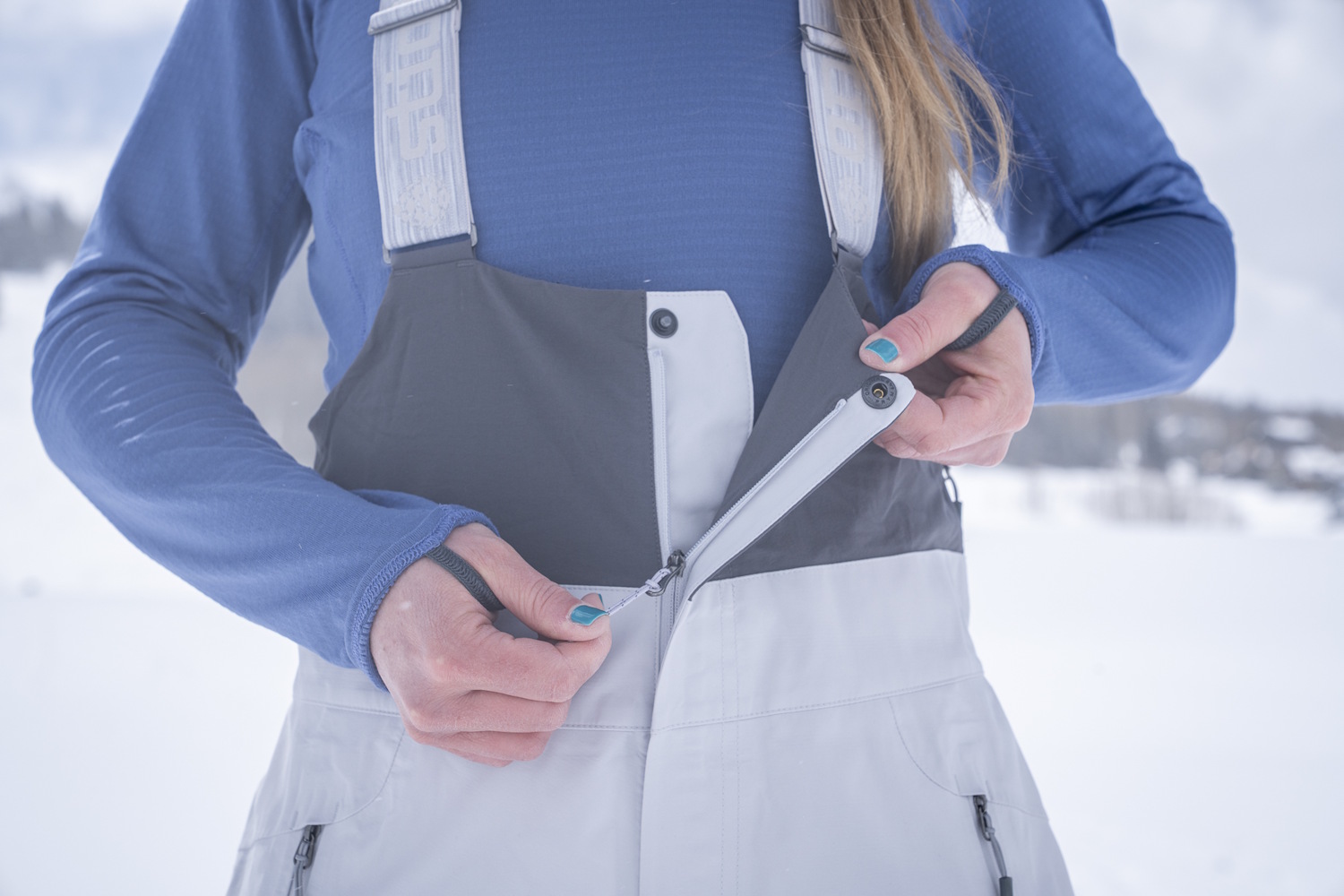

Frequently Asked Questions
Bibs are great at one thing pants can’t do: keeping snow, moisture, cold temps, and wind out from your waist up. With better coverage, protection, and greater adjustability than ski pants, bibs are an excellent investment for those who ski or snowboard in various conditions.
Depending on the design, bibs can provide more pockets than pants. If the fabric reaches the chest, designers typically add at least one pocket to the torso.
Since bibs utilize suspenders, you can expect your pants to stay up without a belt. Some folks love to double-up its bibs with a belt, so the space around its torso can be used as a kangaroo pouch to quickly slide gloves or a hat.


A ski bib should not be too restrictive, leaving room for movement in your hips and legs. You’ll want to be able to squat, lunge, and hinge at the hips, which are the motions you take when you’re hiking up a slope, bending over to clean a binding, or crouching to stand up from the ground.
You should also ensure the ski bib you pick is the right size, fits your height, and easily adjusts up top.
The best ski bibs will have stretch fabric, especially in the quads, glutes, and waist or chest area. All the bibs we’ve reviewed fit well, are made with pliable material, and offer good adjustability via the suspender straps.


Regular, non-insulated ski bibs have a protective, waterproof fabric.
Insulated ski bibs are the same, but with insulation added for warmth. The insulation is usually a synthetic fiber like PrimaLoft, the standard for many ski bibs. Sometimes the insulation is a natural fiber such as wool, which is also breathable and integrated into the Ortovox Women’s 3L Deep Shell Bib Pants.
Manufacturers add varying amounts of insulation to bibs. They may also strategically place insulation in targeted areas like the thighs and glutes, leaving the upper torso and calves uninsulated.
We find that insulation wonders for our energy levels if we’re skiing or riding inbounds at 10 degrees or less, especially if there is wind chill. A little extra warmth on our bottom half is welcomed on chair lift rides, dining outside, or while spectating an outdoor event.
But we don’t like wearing insulated outerwear for uphill travel, backcountry tours, or shoveling — anything high cardio that generates too much body heat. We always wear non-insulated ski bibs for backcountry tours.
You may want to buy a cold-weather-specific insulated pair of pants for those really frigid days on the mountain and a non-insulated shell pair of pants for warmer days. Consider insulated options, especially if you tend to run cold.
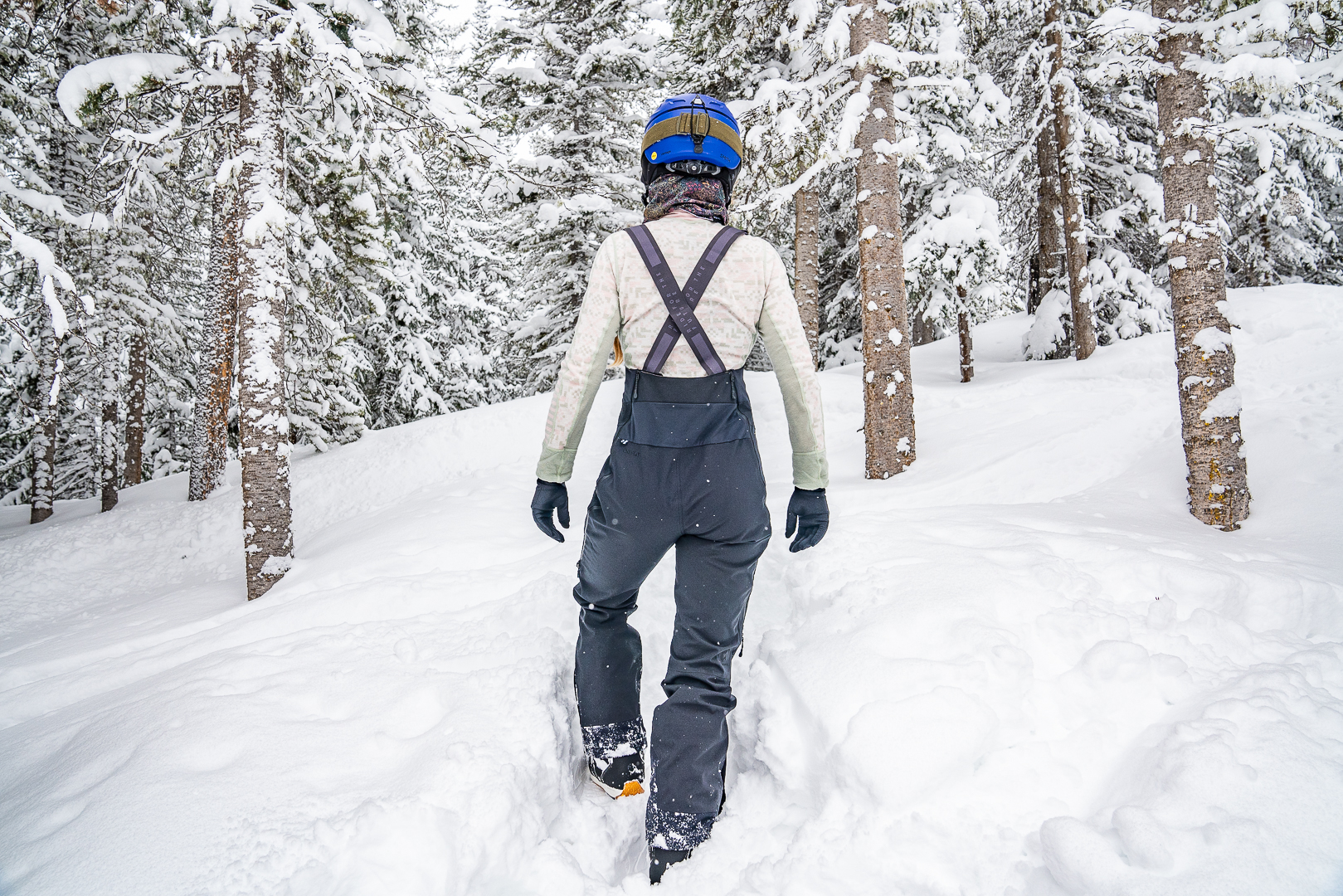

You’ll want to wear base layers underneath a ski and snowboard bib, like a women’s ski jacket and snow pants. In colder weather, you might pull on a light fleece jacket over your base layer and beneath the bib. If it’s super cold out, you may even want to add a light, streamlined puffy jacket or vest.
You wear a 3-layer or 2-layer ski jacket or shell on the outside of your ski bib.
If possible, we recommend trying on a bib with your most-used layers before purchasing.
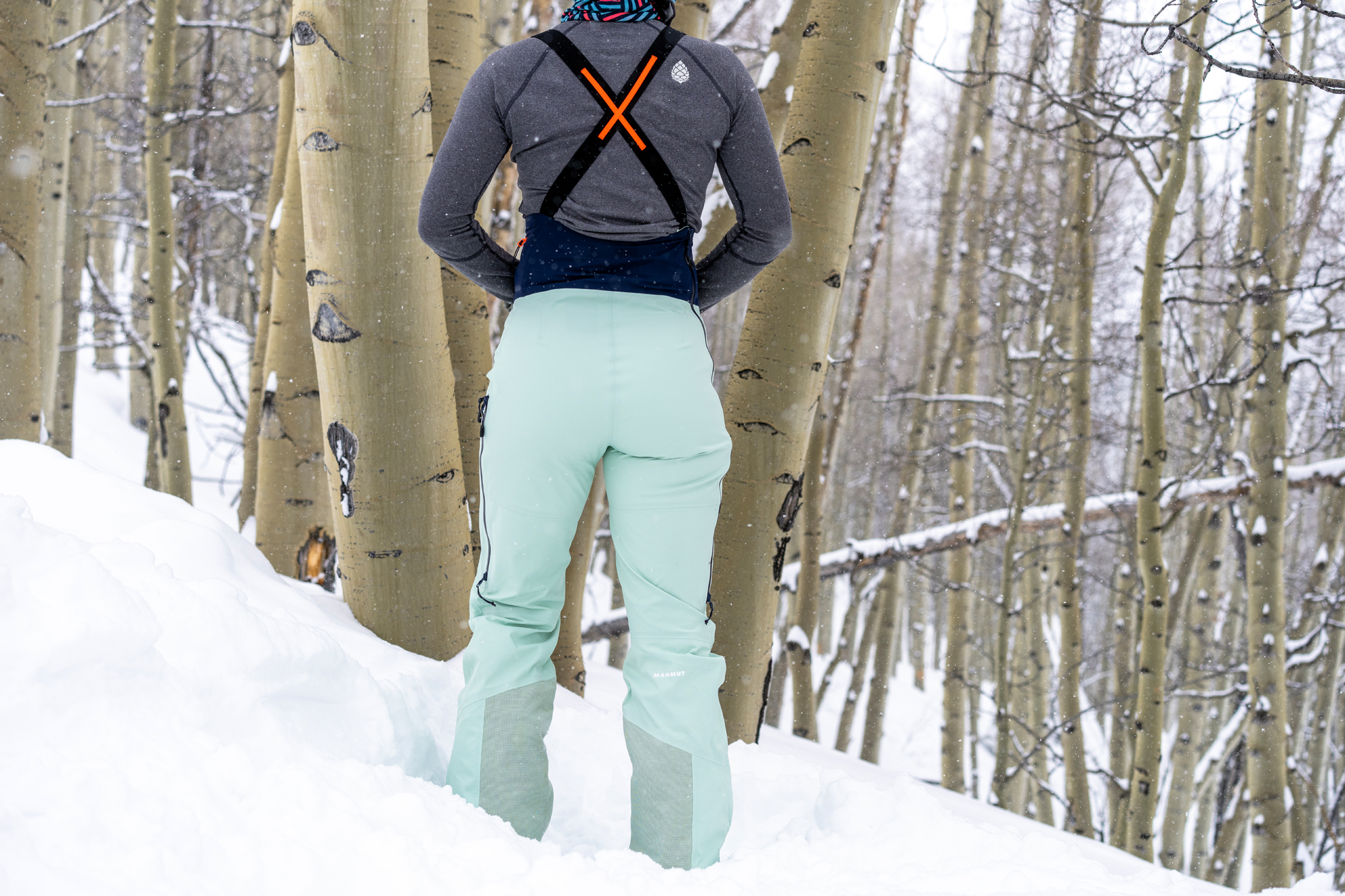



We tested and found the best base layers for women including top picks from Smartwool, Icebreaker, Black Diamond, and more.
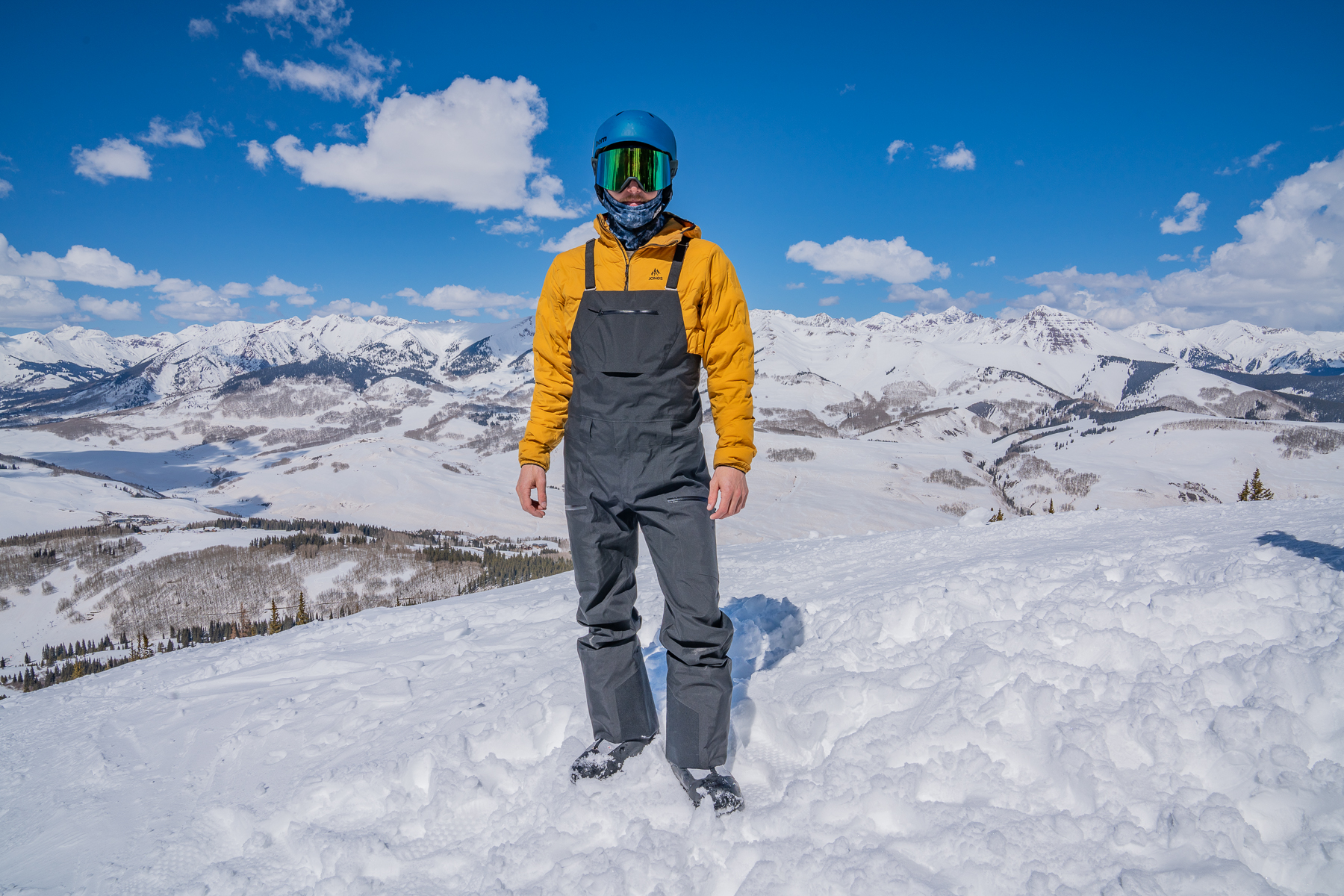

Whether you ski, snowboard, snowmobile, or splitboard, we’ve found the best men’s ski bibs.
Read the full article here




